

International Tourism and Events Management
Develop critical management skills for decision making in the tourism and events sectors, and progress to a career as a specialist with employers such as Historic Scotland, Hilton Worldwide and the Olympics.
- flight Exchange opportunity
- verified Designed with industry
- stars Accredited
- business_center Work placement
- groups Employer events
Available as a one year master's or a two year master's with professional practice.
Tourism and events are among the fastest-growing sectors in the global economy (UNWTO.2023), with destinations adopting event-led tourism strategies as a means to enhance location awareness and reputation and to bring about positive social and economic impact. This is an exciting time for events organisers and tourism specialists to combine their skills and become part of this movement.
Tourism supports one in 10 jobs and provides livelihoods for many millions more in both developing and developed economies (unwto.2022). Informed by industry demand and the array of job opportunities available, Glasgow Caledonian University's MSc International Tourism and Events Management programme delivers the practical and technical experience that you need to maximise the opportunities this growing sector has to offer.
You will gain a variety of experiences, including organising live events, working on simulations, opportunities for networking, volunteering, attending guest lectures from those currently leading in this industry, and so on.
What you will study

Course Information
Find out more.
Ask a student
Read more arrow_forward
GCU community
Scholarships and funding
Social innovation
How to apply
Transformative education
Accommodation
Postgraduate fees and funding
International Study

International Tourism & Event Management
- International Tourism & Event Management, M.Sc. Full time
Your International Tourism & Event Management Master’s program
The tourism industry has a huge importance both in Germany and worldwide. In 2019, more than six percent of all employees in Germany worked in jobs related to tourism consumption and tourism-related goods and services worth nearly 280 billion euros were produced.*
Do you have a bachelor’s degree and want to expand your knowledge in the field of tourism and events? Do you want to prepare yourself for a successful career in a national or international company? Then this master’s program is what you are looking for.
* Aktuelle Daten zur Tourismuswirtschaft. Wirtschaftliche Bedeutung und Nachhaltigkeit. Statistisches Bundesamt (Destatis), 2021.
Career prospects with your study program
After completing your studies in the master’s program in International Tourism & Event Management (M.Sc.) you will have specialized management skills and an extensive knowledge of the tourism and event industry. You will know about current trends and relevant innovations as well as the specific technological progress which is necessary for the competitiveness of companies. This gives you plenty of opportunities for a successful career.
The master’s program in International Tourism & Event Management (M.Sc.) offers you the know-how you need to start a national or international career in the tourism and event industry. After graduation, you will be well-equipped to work in jobs in:
- Travel sales and organization
- Accommodation
- Destination management
- Event organization
- Travel management
- Trade fairs
It is also possible to pursue a doctorate after successfully completing your master’s degree.
Your study program in detail
The application-oriented, internationally targeted master’s program in International Tourism & Event Management (M.Sc.) provides you with an in-depth knowledge in business and management as well as comprehensive know-how in tourism and events. In addition, you will broaden your intercultural and your language skills and will have the opportunity to develop your profile with an elective module, an internship, or a semester abroad.
During your studies, you will explore a variety of subjects related to management, the tourism and events industry, but also topics such as artificial intelligence, experience marketing and design, or crisis, safety, and security management. Some of the many topics that await you include:
- International tourism management
- International event management
- Guest relationship management
- Tourism planning and development
- Innovation management and design thinking
- Experience marketing and design
- Crisis, safety and security management in tourism and events
- Artificial intelligence in the hospitality industry
In addition to compulsory modules, the master’s program in International Tourism & Event Management (M.Sc.) offers you the opportunity to pursue your personal interests and develop your professional profile. In the third semester, you can choose an elective module of one of the following topics:
- Corporate finance
- Sustainability management and CSR in a global context
- Consumer behavior and psychology
- Strategic marketing and brand management
Alternatively, you can choose to complete an internship instead of an elective module or opt for a semester abroad.
Practice-oriented learning is a top priority at Hochschule Fresenius. If you join the master’s program in International Tourism & Event Management (M.Sc.), you can expect application-oriented teaching from experts who will pass on their broad professional experience. You will work on projects and case studies, collaborate on team projects, and might opt for an internship as part of your elective modules. Interactive learning, excursions, guest lectures, and workshops are also common practices at Hochschule Fresenius.

Request your info brochure
Get the most important information about your study program at a glance., your way to hochschule fresenius.
To be admitted to the master’s study program in International Tourism & Event Management (M.Sc.) at Hochschule Fresenius, you need to fulfil the following requirements:
You must have completed a bachelor’s study program with at least 180 credit points.
In your bachelor’s degree, you must have gained 60 credit points in the fields of business or economics.
For more information, please contact our Study Advice Service.
You need to provide evidence that your English language skills are equivalent to Level B2 of the European Framework of Reference for Languages.
Have you not completed your bachelor’s degree yet? At Hochschule Fresenius, you can start your master’s program and finish your bachelor’s program at the same time, provided you have attained at least 80 percent of the credit points by the time of matriculation. In addition, bachelor’s students at Hochschule Fresenius will only pay the monthly master’s tuition fee when starting the master’s program.

Get to know us
- Our Study Program Portfolio and Benefits that await you at Hochschule Fresenius – University of Applied Sciences!
- Alle Infos rund ums Master-Studium – jetzt und hier…
- Kaffeeklatsch an der Hochschule Fresenius Hamburg
- Semester abroad: “The time I spent in New York was just beyond words”
- “I have found a second home in New York City”
- COLOGNE MEETS NEW YORK
- SEMESTER OPENING WITH BEACH VOLLEYBALL TOURNAMENT
- TAVEC Project: New York meets Cologne
- Innovation, Agile Management, Internationalization – an exciting summer semester at the International Business School in Berlin
- EXPERT TALK: SUSTAINABLE FINANCE
- CRAFTING YOUR CAREER
- CAREER OPPORTUNITIES FOR AN INDUSTRIAL ENGINEER: FROM LEAN PRODUCTION TO THE DIGITAL WORLD
- We are all winners! – The first TAVEC Conference
Get in touch
Events Management: An International Approach
Journal of Tourism Futures
ISSN : 2055-5911
Article publication date: 17 April 2018
Issue publication date: 15 May 2019
- Events management
- Contemporary issues
- Case studies
Hay, B. (2019), "Events Management: An International Approach", Journal of Tourism Futures , Vol. 5 No. 1, pp. 104-105. https://doi.org/10.1108/JTF-03-2017-0008
Emerald Publishing Limited
Copyright © 2018, Brian Hay
Published in the Journal of Tourism Futures . Published by Emerald Publishing Limited. This article is published under the Creative Commons Attribution (CC BY 4.0) licence. Anyone may reproduce, distribute, translate and create derivative works of this article (for both commercial & non-commercial purposes), subject to full attribution to the original publication and authors. The full terms of this licence may be seen at http://creativecommons.org/licences/by/4.0/legalcode
In the last three decades, there has an unprecedented growth in event management studies, covering not only the familiar and well-known international mega events, but also the growing recognition of national, regional and local community-based events. It is easy to forget that the first academic course in event management was developed a little over 25 years ago, and today, there are event management programmes that range from technical diplomas to PhDs. The first edition of the book was published in 2012, but given the rapid change in our understanding of the issues facing event managers, there is a greater need for event management students to be even better informed of the challenging and emerging issues facing the sector. This second edition attempts to build, develop and update the issues raised in the first edition.
In words drawn from the preface, this book takes an “explicit international approach […] to prepare students for the realities of working in (the) sector”, and like the first edition, it highlights “key critical global issues affecting events”. This second edition also highlights and focusses on some of the key drivers in event management, as well as exploring a number of new theoretical advances within the events sector. This second edition differs from the first, by removing some of the extended case studies (but still makes very good use of a number of practical case studies) and has added four new chapters, which cover topics, such as: the increasing importance of social media, a much stronger emphasis on international events and the inclusion of more case studies from North America, Europe, Africa, Asia and Australia.
As with an increasing number of text books, the book itself is only one of a number of links to support the students learning experiences. Through access to an accompanying website, the students can make use of additional learning resources: including free online reading material from the Sage journal database, and video links to case studies which help to illustrate the issues raised in each chapter. For lecturers, there is a supporting instructor’s manual, along with teaching notes as well as a list of suggested learning tasks.
The book covers 14 chapters written by 22 authors from countries such as: Australia, Bulgaria, Italy, the Netherlands, Taiwan and the UK. Although it is not surprising that most of the authors are from academia, a fair number of them have also worked in the events sector, while other authors are currently working in the sector. This is one of the strengths of the book, it explores issues through the eye of the practitioner. As for the book itself, it is grouped into three well-defined sections, the first section “Introducing an International Approach to Events Management” explores through two chapters, the macro contextual factors, challenges and issues faced by the events management landscape, by exploring both the positive and negative impacts of global issues and how they impact local event management decisions. The second section “International Events Management in Practice” is the core focus of this book, and covers in eight chapters the management issues that event managers will face in practice. These chapters are well-constructed and packaged, and in each chapter, the current research knowledge on the topic along with the event manager’s perspectives into issues are explored, along with a well-chosen case study, which illustrates the points issues raised in the chapter. The individual chapter topics covered in this section are: event design, managing events, team building, marketing, sponsorship, financing issues, risk management and the particular challenge of event evaluation. These chapters also illustrate the challenges faced by international events, and how lessons from such events can also be applied to more local events. The final section “Contemporary Issues in International Events Management” focusses on four chapters on emerging issues, including: the growth and impact of social media before, at and after the event; corporate social responsibility and sustainability, and questions the seriousness of event managers in fully understanding these issues; the importance of events to a destination’s tourism profile and whether events alone, can change this profile. The final chapter looks to the future of events by exploring through scenario planning how event managers can “future proof” their events. It concludes with advice for event management students, that by understanding future changes impacting the sector, they can be better prepared for future job opportunities.
While it would be wrong to say, the book was fun to read, but it was certainly enjoyable to read. Unlike many second editions, it is a genuine improvement on the first edition, as it not only covers new issues, but also was not afraid to change the format, for example, by dropping the extensive use of very detailed case studies. Edited books with multiple authors can sometimes read like a series of unrelated and loosely linked chapters, using many of the same dated references. This cannot be said about this book, as the editors and authors worked hard to link the chapters together, to bring a level of consistency often missing from edited books, with for example, references to other chapters so that the reader could better understand the linkages in the discussions. It was particularly helpful that a common format was adopted for each section/chapter: an overview the chapters in each section; clear learning objectives for each chapter; a well-written chapter summary; relevant case study along with questions for the reader to consider; listing of useful websites; additional reading material along with a short sentence explaining the content of these references. The great strength of the book and this is to be commended, was the extensive use of relevant case studies, which added substantially to the quality of the reader’s experience.
It is difficult to make any serious criticisms of the book, as it is an improvement from the first edition, but my suggestions in any third edition, would be the provision of a separate listing of the case studies in the index, along with additional case study material on the publishers website. This would add appeal to event practitioners, as it would aid them in their future planning. In addition, I would like to see some more insights and lessons about events from other destinations, in particular from Africa, South America and China, all of which have a rich history of local and national events.
Finally, in terms of a recommendation, as I said before the book was an enjoyable read, which provided a lot of useful insightful and practical information for event management students. Indeed, I would find it difficult to understand why the book should not form part of the reading list of any event management course, as it covers all the key issues that event management students should be exploring. However, the book deserves a wider readership, it should also be of interest to tourism students, and also to those working in event management, as many of the issues will be familiar to them in their day-to-day work. Although this book could not be described as essential reading for tourism futurologists, it does discuss issues that will impact the future direction of events management within a tourism context, and as such the book should be welcomed by tourism futurologists.
About the author
Brian Hay is a Professor of Tourism at the School of Social Sciences, Heriot-Watt University, Edinburgh, UK.
Related articles
We’re listening — tell us what you think, something didn’t work….
Report bugs here
All feedback is valuable
Please share your general feedback
Join us on our journey
Platform update page.
Visit emeraldpublishing.com/platformupdate to discover the latest news and updates
Questions & More Information
Answers to the most commonly asked questions here
- College of Hospitality, Retail and Sport Management
- Location Location
- Contact Contact
- Colleges and Schools
- Degree Programs
- International Hospitality and Tourism Management, M.I.H.T.M.
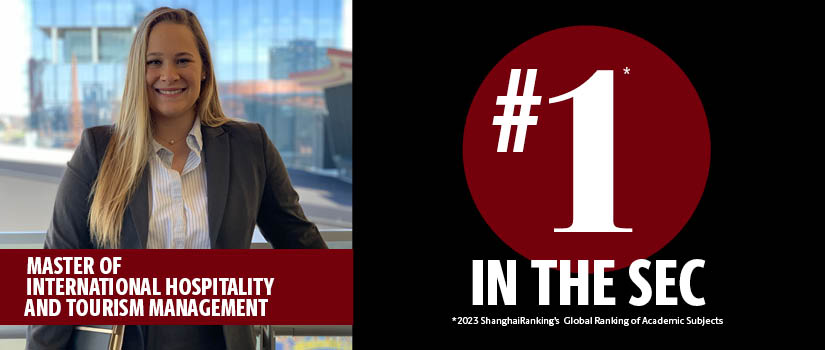
Master of International Hospitality and Tourism Management
The University of South Carolina’s Master of International Hospitality and Tourism Management degree is designed for industry professionals who want to advance their careers.
Learn from world-renowned scholars and industry experts at one of the top graduate programs in the country. The University of South Carolina's School of Hospitality and Tourism Management is ranked No. 1 among Southeastern Conference Schools for hospitality and tourism management.
Degree Program Highlights
- 30 credit-hour program: Earn your master’s degree in one year!
- Flexible curriculum delivery: Study online or on campus.
- Thesis and professional tracks.
- Learn from global scholars and industry leaders

Alumna Spotlight
Laurie Savidge realized the work of a coastal resort only begins with hospitality. Today, this business professional works to protect the natural world, too.

Career Success
Mamee Groves (left), a two-time USC graduate and MIHTM alumna, is now regional vice president of food and beverage with Invited. She remains active with HRSM as an adjunct professor and participates in panel discussions for the college as well.
On Your Schedule
Students have the option to earn their master's degree in hospitality and tourism management on campus or via distance learning and at their own pace. Synchronous distance delivery using Adobe Connect provides remote students with an engaging, interactive classroom experience where they learn in real time with on-campus classmates and professors. Additional asynchronous course options give students the flexibility to complete courses online and at their convenience.
Customized Curriculum
The degree program includes 30 credit hours of innovative classes covering specialized topics in business analytics, strategic leadership, marketing and social media, customer experience management, talent management and finance. Elective courses and field projects allow students to tailor their degree to their interests, including international learning opportunities. Thesis (research) and non-thesis (professional) tracks are available to match students’ career objectives.
Industry Innovation
The School of Hospitality and Tourism Management is home to world-renowned scholars, industry experts and impactful research centers that provide opportunities for students to get involved in cutting edge research:
- SmartState Center of Economic Excellence in Tourism and Economic Development
- International Institute for Foodservice Research and Education
- International Tourism and Research Institute
- Wine and Beverage Institute
Graduate Spotlights
Three ways to get started.
- For current bachelor’s degree students, the accelerated bachelor’s to master’s program allows you to start taking graduate classes as part of your undergraduate coursework. This option is perfect for any student who wants to graduate with two degrees in less time.
- Working professionals and alumni who aren’t ready to commit to earning their master’s can take a “test drive” of up to two classes as a non-degree seeking student. Those classes will count towards a master’s degree if the student later decides to join the program. Prospective students interested in this option can fill out our interest form or visit the graduate school’s non-degree seeking student application .
- And for students who have their undergraduate degree and are ready to earn their master’s, we accept new students throughout the year and can create a course plan that matches your career goals and schedule. More information on how to apply to the MIHTM program is below.
Application Deadlines
- Spring semester: November 15
- Summer session: May 1
- Fall Session: July 1
International student deadlines are one month earlier.
Admission Requirements
All applicants for the MIHTM program must apply through the Graduate School . For more detailed information about the specific degree requirements, please visit the academic bulletin . Prospective students should complete the main application form and pay the $50 application fee online. In addition, applicants must send all supporting material directly to the Graduate School.
The following supporting material is required with the application:
- A current resume.
- A one- to two-page statement of career objectives that states how the MIHTM curriculum will help the applicant achieve their career objectives.
- At least two letters of recommendation, with at least one from a current or former professor who can comment on the applicant’s ability to succeed in graduate studies. Applicants will send out requests for letters of recommendation from within the ApplyWeb application. The Graduate School does not accept recommendations sent directly from applicants.
- One official transcript from each college or university attended (undergraduate and, if applicable, graduate). Successful applicants generally have a GPA of 3.0 or above (on a 4.0 scale).
- Official Graduate Management Admission Test (GMAT) or Graduate Record Exam (GRE) scores. Successful applicants generally score at least 500 (verbal and quantitative combined) on the GMAT or at least 300 on the GRE. GMAT/GRE scores more than five years old will not be accepted under any circumstances. The codes for submitting scores are JV2 (GMAT) and 5818 (GRE).
- Applicants whose native language is not English must submit TOEFL or IELTS scores. International applicants who have received a degree from a college or university in the United States are not required to submit a TOEFL or IELTS. Test scores are valid for two years only.
Here to Help
Want more information or to speak with someone regarding our Master of International Hospitality and Tourism Management degree program? Fill out our form and we'll be in touch!
Get in Touch

Scott Taylor, Jr., Ph.D.
MIHTM Program Director Wine and Beverage Institute Assistant Director Assistant Professor School of Hospitality and Tourism Management
[email protected] 803-576-7389
Challenge the conventional. Create the exceptional. No Limits.
Suggestions in Courses
Suggestions in news.
- No suggestions found.
Suggestions in Events
International events, leisure and tourism management - msc.
Many of our students are eligible for a Postgraduate Loan of over £10,000.
Entry requirements
You will be required to have:
- an honours degree with minimum lower second (2.2) in related academic of business-related subjects or two or more years of professional or industry-relevant experience (proven track record, employers’ letter, professional qualifications etc)
- a minimum of GCSE grade C/grade 4 or above in English and Maths, or Functional Skills Level 2 (pass)
- two letters of reference about your suitability to undertake academic studies at master’s level
A full online application will need to be submitted, which includes a detailed supporting statement on why you want to study the course. You should also submit an up-to-date CV and copies of award certificates.
Advanced entry is possible if you hold a Postgraduate Certificate (PG Cert) from a business and management discipline, awarded no more than five years prior to the application date. Accreditation of Prior Learning (APL) for individual modules, (from a business and management discipline), up to 40 credits (with the exception of Research Methodology and Dissertation modules) may also be possible if you’ve achieved those no more than five years prior to the application date. Such applications are also subject to the University’s academic regulations and processes.
Submitting your application will not be a guarantee of admission, and the final admissions decision rests with the course leader.
*If you have a non-related or non-standard academic background will be interviewed face-to-face, or if that is not possible, via video conference technology (interviews via telephone will not be accepted).
Accreditation of Prior Learning
Any university-level qualifications or relevant experience you gain prior to starting university could count towards your course at London Met. Find out more about applying for Accreditation of Prior Learning (APL) .
English language requirements
To study a degree at London Met, you must be able to demonstrate proficiency in the English language. If you require a Student visa (previously Tier 4) you may need to provide the results of a Secure English Language Test (SELT) such as Academic IELTS. This course requires you to meet our standard requirements .
If you need (or wish) to improve your English before starting your degree, the University offers a Pre-sessional Academic English course to help you build your confidence and reach the level of English you require.
Modular structure
The modules listed below are for the academic year 2023/24 and represent the course modules at this time. Modules and module details (including, but not limited to, location and time) are subject to change over time.
Year 1 modules include:
- spring semester - Wednesday morning
The module introduces you to financial decision making principles and financial analysis of business performance with examples from Events, Leisure, Tourism, Culture and the broader Creative Industries sector.
The module starts by looking at the role of financial statements in a business and explores how they capture the value of a business. You will develop an overview understanding of fundamental accounting/finance concepts and principles and techniques in relation to financial statements analysis. You will also explore issues of management accounting techniques and examine their use in financial management decision making. You will also discover the key sources of finance for business and understand how to determine the most appropriate financing strategy for a business.
Finally, you will explore links between finance, corporate governance, strategic financial decision making, company value and transactions, using different cases in the context of Events, Leisure, Tourism, Culture and the broader Creative Industries, to illuminate understanding.
Aims of the module: 1. To enable students to develop an overview understanding of financial decision making principles through examples from Events, Leisure, Tourism, Culture and the broader Creative Industries sector. 2. To enable students to critically understand the value and usefulness of financial statements; by focusing on fundamental concepts, principles and techniques in relation to financial statements analysis, through the application of appropriate examples, tools and procedures. 3. To identify issues of financial management and accounting techniques, and how results from such analysis may support the development, measurement and management of decision-making in the context of Events, Leisure, Tourism, Culture and the broader Creative Industries sector. 4. To identify and evaluate links between accounting, financial statement analysis, corporate accounts and financial management strategies, in the context of Events, Leisure, Tourism, Culture and the broader Creative Industries.
- spring semester - Monday afternoon
The module presents an overview of the current key issues of Fundraising and Public Relations (PR) in the context of Events, Leisure, Tourism and the broader Creative Industries. This module aims to develop a broad, informed and critical understanding of some of the key and complex issues surrounding fundraising, in UK and worldwide. It also examines some key contemporary issues, theoretical and practical perspectives in PR at both national and global levels. Both underpinned by current academic and professional research in Fundraising and PR, to aid students to gain insights into contemporary, academic and applied practices. Aims of the module: 1. To enable students to enhance their understanding of the theory and practice of Fundraising and PR in the relevant industry context. 2. To enable students to critically understand and use theoretical and practical skills and tools related with Fundraising and PR in the relevant industry context. 3. To equip students to critically discuss issues and increase their awareness of the impact and influence of Fundraising and PR related issues in the decision making process of Events, Leisure, Tourism and the broader Creative Industries sector. 4. To stimulate critical awareness in the light of relevant academic theories and current professional practice, and the ability to apply, current theories, practices and tools of Fundraising and PR, in professional settings.
- autumn semester - Monday afternoon
This module critically explores issues of marketing management in the context of Events, Leisure, Tourism and the Creative Industries. It covers some of the essentials of marketing management theory and offers a structured approach to identifying, understanding and solving marketing management problems. The concepts, principles and frameworks examined in the module apply nationally and internationally to a wide range of organisations and sectors, with a focus in core Events, Leisure, Tourism and the Creative Industries activities. This core module supports the development of the learner through their engagement with marketing management theory and further develops their prior relevant skills through the application of theory to practice. It also prepares for and develops an organisational level leadership and/or management role in marketing management. The module draws on a wide-range of academic research and professional experience. It introduces some of the core marketing management concepts and encourages students to develop a critical, analytical approach to solving work-based marketing management issues. Students should be able to develop an awareness of different theoretical perspectives to explore the complexity of marketing management work as rigorously as possible. The module provides an overview of current academic research, practical industry examples and work-based issues. It encourages students to reflect on current practice and on the role of marketing management in the Events, Leisure, Tourism and the Creative Industries sectors. Aims of the module: 1. To enable students to enhance their understanding of the theory and practice of marketing management in the relevant industry context. 2. To enable critical understanding and deploy theoretical and practical marketing management tools applied to contemporary challenges in the industry. 3. To equip students to critically discuss issues and make marketing management observations and recommendations applicable to the appropriate sectors, organisations and brands. 4. As well, this module aims to stimulate the student’s critical awareness and application of marketing management theories to their own practice and develop their ability to evaluate current practice in the light of relevant academic theories. It is expected that students will develop an increased awareness of the impact and influence of marketing management related issues and decision making.
- autumn semester - Wednesday morning
The module critically explores current issues of project and quality management in the context of Events, Leisure, Tourism and the Creative Industries. Managers and executives at all levels within the Creative Industries sector typically manage projects and deal with quality management issues. The module covers essential concepts and offers key knowledge, skills and a structured approach to identifying, understanding and solving some of the issues of project and quality management. The concepts, principles and frameworks covered, apply both in the UK and internationally, to a range of organisations and sectors, focusing on Events, Leisure, Tourism and the Creative Industries. Aims of the module: 1. To enable students to enhance their understanding of the theory and practice of project and quality management in the Events, Leisure, Tourism and Creative Industries context. 2. To enable students to critically understand and use, theoretical and practical skills and tools, which apply to project and quality management business challenges in contemporary Events, Leisure, Tourism and the Creative Industries. 3. To equip them to critically discuss issues and make appropriate choices, based on project and quality management observations and recommendations that are applicable to their sectors, organisations and brands. 4. To stimulate students’ critical awareness of academic theories and current professional practice, and their ability to apply theories and tools to the practice of project and quality management in their current and future career settings.
- summer studies - Friday morning
- autumn semester - Friday morning
- spring semester - Friday morning
This module provides you with the opportunity to work on specific business issues that organisations are facing. Utilising your competences of handling and managing business challenges, starting from problem identification and concluding with solution-related recommendations, thus encouraging research into real world business issues impacting organisations. Useful and applied business research, like useful reflection, leads to change. To that end, students will be encouraged to take a pragmatic approach to their research, seeking always to create actionable conclusions of value to business managers, owners and entrepreneurs. The aims of the module are to: 1. Foster a critical awareness and deep interest in a management/business issue or topic associated with their subject specialist area and to combine knowledge and analyses acquired in modules to explore that topic in depth 2. Enable students to produce a full business research report and a management summary on an appropriate topic to a professional and engaging standard that provides the basis for action. 3. Encourage reflection to critically evaluate the success of a business-related project and assess personal competence in the light of current knowledge and skills. 4. Build each student’s knowledge and confidence in their chosen subject to facilitate employability. The expectation is that students will undertake research in areas of interest to them that is in context to their chosen programme and that develops knowledge and skills that support employment. Examples of possible areas of research include: • Evaluation of an opportunity to enter a new market e.g. is it feasible for a low cost airline to enter the market in Brazil? • Evaluation of a specific firm’s strategy and performance e.g. how is Ford responding to the advent of electric vehicles, driverless technology and ride sharing? • Analysis of the impact of technology change on a company, industry or sector e.g. how will driverless technology and ride sharing impact on car ownership? • Analysis of trends to create potential strategic scenarios for a firm or industry e.g. what are the future scenarios for law firms in the light of the adoption of AI? • Analysis of competition in a specific market or industry e.g. global competition in the rapidly growing e-bike industry • Identifying solutions to a specific business problem e.g. with a small or medium sized business e.g. what needs to be done to grow the business to the next level • Analysis of disruption in an industry and the implications for a specific incumbent e.g. how should a black cab driver respond to Uber and other ride sharing platforms? • Analysis of the effect of government intervention in a particular industry e.g. the current trade dispute over subsidies to Boeing and Airbus • Response from Banks and FIs to the changing customer interaction and business landscape in the post pandemic era
- summer studies - Wednesday evening
- autumn semester - Friday evening
- spring semester - Wednesday evening
This module provides students with the opportunity to undertake research projects on specific research questions related to their course.
Students will critically investigate issues cognate to their programme of study. The aim will be to make proposals or recommendations for the future and / or a contribution to extant theory.
Students are expected to utilise appropriate investigative techniques and standards of data collection and analysis as they write their postgraduate research-based dissertation.
The dissertation will be 10,000 words in length.
The dissertation module has the following aims:
1. To facilitate a detailed investigation of one area or topic within the subject field;
2. To develop a thorough analysis and synthesis of theory, policy and practice in relation to the chosen topic;
3. To provide an opportunity for critical reflection on the research topic.
The expectation is that students will undertake research in areas of interest to them that is in context to their chosen course; the research supervisor will be allocated by the subject area within which the course is located.
- summer studies
This module is one of three triple-weighted module alternatives open to students (alongside the dissertation and the consulting report). The module provides you with the opportunity to showcase your professional skills in the execution of business-related tasks and experiential learning in the form of a work placement. When executing business tasks, successful practitioners are able to critically evaluate organisational matters and apply their knowledge to contribute strategies, ideas, recommendations and solutions that add value to their organisation. Furthermore, successful practitioners actively develop and shape their own behaviour, capabilities and identity. By critically reflecting on their experiences in work, they are able to develop their own capabilities and skills, and have the ability to understand how they personally add value to an organisation. It is the development and application of these capabilities in a professional context that is explored in this module. The 1st week of the yearlong Workplacement programme will introduce students to the module and to the first task, the production of a substantial management report that helps to investigates a specific organisational opportunity or issue. This is a significant independent project, where you determine the subject to be investigated and the methodology to be followed. Your project is an ideal opportunity to seek out and draw upon a wide range of knowledge, and for you to demonstrate how this underpins any final conclusions and recommendations. Your project will help you demonstrate your ability to think and act independently when executing a complex and challenging task. The remaining period of the module is spent in the work placement with an employer, which you will have secured during your time on programme (or before). This practical experience will allow you to explore and test your own professional competence in a specific working environment. You will maintain a Professional Development portfolio of your experiences and will, ultimately, be able to articulate your understanding of how you personally add value in a professional context. Again, you will be expected to draw on a wide range of knowledge to help evaluate and explain your experiences. Educational Aims This module aims to:
• Allow you the opportunity to carry-out an in-depth project where you can integrate the knowledge and professional skills you have gained throughout your programme. • Ensure you are able to identify and utilise different types of knowledge to influence your thinking or action. • Help you develop robust business research skills and an ability to formulate new ideas and solutions through the analysis of primary and/or secondary data. • Allow you to explore your own skills, character and identity within a professional environment and to identify key attributes that will aid long-term success in your chosen career field. • Facilitate your development of good reflective practice, ensuring models and concepts can be used effectively in the critical evaluation of your performance. • Ensure you learn how to integrate knowledge, experience and reflective practice to continually develop your professional skills and competence.
Please note: • Students are responsible for applying for opportunities and to engage with the Module Team/Work Based Learning teams to assist them. • The suitability of any opportunities will be assessed by the Module Team/Work Based Learning Team and all placements must meet Health and Safety requirements for Higher Education Work Placements. Those studying on a Student Visa will only be able to complete a work placement if it meets UKVI monitoring requirements including: approval of the placement dates and hours by the Placement Officer prior to starting the placement, submission of weekly timesheets for the hours undertaken, signed by their line manager/supervisor and continued engagement with the Placement Officer as well as the International Student Support and Compliance Team.
- spring semester - Thursday afternoon
This module will focus on the concept of e-commerce within aviation management and the impact of the digital age will continue to have on the strategic activities of airlines and airports. The start of the e-commerce revolution was back in 1995 with the first innovators including Alaskan Airlines and British Midland developing their first website booking engines. Since this time the global online travel sector has grown to generate more than half a trillion dollars in revenue.
Airline e-commerce in all its forms is projected to grow significantly as we move into the 21st century. The ‘e’ story is about the continuing evolution of internet-based technologies and the proliferation of new internet-based applications. This development is shifting and enhancing the power of consumers and airlines to a more direct relationship and minimising the power of the intermediaries (travel agents). A particular focus on the new types of airlines and airports that are exploiting the e-commerce agenda and how the legacy carriers are having to adapt to these new sales and marketing dynamics.
- autumn semester - Wednesday afternoon
The field of corporate social responsibility has practically transformed our world and reoriented the way corporate entities conduct and perceive their operational activities. Corporate managers and those who represent corporate entities are expected to always behave ethically. Modern societies now expect that solutions to our social and environmental problems cannot only be the prerogative of nation governments, businesses of the 21st century have a lot to contribute when finding solutions to these problems. The demands modern stakeholders put before corporate entities have continued to increase; tomorrow’s managers need to know how to meet these demands. Some scholars have in fact argued that corporate social responsibility has drawn our attention to some of the excesses which globalisation has brought unto the corporate scene in the 21st century. We have seen some unacceptable practices which have accompanied globalisation and consequently made the job of CSR and what it advocates much more difficult. Many things have been made a lot more challenging for everyone because of this. We cannot ignore the adverse impacts of these excesses. There are several unacceptable practices in the form of injustices and human rights abuses, extreme poverty in several nation states both - emerging and even some advanced nations, environmental degradation, some irresponsible and reckless practices by some corporate leaders and terrorism on a very large scale. In recent years, a number of social, economic and environmental problems have continued to cause concern to us all, for example, climate change, waste management and irresponsible use of our depletable resources just to mention a few. Sustainable Development is a buzzword in CSR; both corporate and individual citizens still need to demonstrate that we are serious in executing what sustainable development means to us, what it requires from us all and how the needs of future generations of all inhabitants of this planet would be sustainably met; these are issues tomorrow’s managers would need to know how to embed in corporate strategies. This module aims to lay the foundation on how modern managers should address these and other CSR related issues.
Note: If there are not sufficient student numbers to make a module viable, the School reserves the right to cancel such a module. If the School cancels a module it will use its reasonable endeavours to provide a suitable alternative.
- spring semester - Monday morning
- spring semester - Tuesday morning
- spring semester - Tuesday afternoon
- spring semester - Wednesday afternoon
- spring semester - Thursday morning
- summer studies - Tuesday morning
- summer studies - Tuesday afternoon
The aim of the module is to prepare students to lead and develop people in a complex international environment, to build high performance teams and to create a productive work environment and culture. Over the course of the module, you will learn from relevant contemporary research, theories, and examples of business practices both past and present. Management and leadership go together in business organisations, with managers typically expected to lead others as part of their role. The module will examine the roles and responsibilities of manager and leader, and the demands on these roles in international, digitally enabled businesses.
Critical to the value of the module is the encouragement of continuous learning and reflection in order to be effective in a changing world. You will have the opportunity to assess their own capabilities using Strengthscope.
The aim of the module is to ensure that students will:
- understand the role of business leaders and business managers in creating successful business organisations, cultures and working environments
- have the necessary knowledge of leading, motivating and developing to enable them to take on a management role successfully
- be able to evaluate their own capabilities and skills in relation to managing themselves and leading others
- be equipped to assess the challenges associated with workplace change and make a valuable contribution to the management of change.
- autumn semester - Tuesday morning
- autumn semester - Tuesday afternoon
- autumn semester - Thursday morning
- autumn semester - Thursday afternoon
Operations and Technology Management is core to two MSc Pathways, MSC International Business Management and MSC International Business Management with Project Management.
A business adds value through its operations, but only in combination with others in the value network or eco-system, critically linked by the use of technology. Matching internal operations capabilities to changing market (and regulatory) requirements, whilst responding to a tidal wave of data from suppliers, customers and digital platforms involves operations in strategy, design, planning and control, supply chain, improvement techniques like lean but also the technology to connect and join up the dots to capture value.
The module aims to equip students with a broad understanding of operations and technology management that will make them stand out from their peers through being able to grasp how value is being created. The potential for AI and robotics to further increase the use of technology in the operational domain is already clear, whether using AI in legal processes or in robots that flip burgers, an understanding of the links between technology and operations is critical for anyone aspiring to be a business manager, owner or entrepreneur. Analysis is the core of the module, for example through process mapping, and problem solving using both case studies and other active learning exercises.
On successful completion of this module:
- You will understand the basis of the value Operations and Technology Management creates in any organization in any sector
- You will be able to recognize the key concepts and principles of operations and technology management that need to be implemented to support that value creation approach.
- You will be able to critically assess various techniques of product, service design and improvement, deploying a contingent approach to what works best and where
- You will be able to apply appropriate Supply Chain Management techniques in the light of your new knowledge of the scope (and management of) of inter-organisational co-operation
- You will be able to evaluate the necessary trade-offs that have to be made between operations management performance objectives and achievable performance
Where this course can take you
Our International Events, Leisure and Tourism Management MSc offers opportunities to pursue career routes in events, leisure, tourism and the broader creative industries sector, both in the UK and internationally.
On graduation, you should be equipped for executive, management and leadership related positions in the creative industries sector in UK and internationally. Our course is designed for both those already working in the industry (as a career booster) or those seeking to enter the industry or the wider sectors.
For current and aspiring managers, leaders and executives, the course will offer an opportunity to enhance and improve your academic skills and develop industry-specific knowledge.
Potential career routes, destinations and jobs for graduates include:
- events management and executives
- leisure executives and managers
- tourism executives and managers
- hotel managers and executives
- conference executives and managers
- entrepreneurships routes
Additional costs
Please note, in addition to the tuition fee there may be additional costs for things like equipment, materials, printing, textbooks, trips or professional body fees.
Additionally, there may be other activities that are not formally part of your course and not required to complete your course, but which you may find helpful (for example, optional field trips). The costs of these are additional to your tuition fee and the fees set out above and will be notified when the activity is being arranged.
Important information for international applicants
Due to unprecedented demand for our courses for the autumn 2023 intake, international admissions are now closed for this course. Any future intakes that are already open to applications can be found in the fees and key information section of this course page. If no future intakes are available, please check back at a later date.
How to apply
Use the apply button to begin your application.
If you require a Student visa and wish to study a postgraduate course on a part-time basis, please read our how to apply information for international students to ensure you have all the details you need about the application process.
When to apply
You are advised to apply as early as possible as applications will only be considered if there are places available on the course.
Apply for this course
Please select when you would like to start:
News and success stories
Meet the team.
.jpg)
Ioannis Soilemetzidis
Course leader
.jpg)
Natalie Langley
Course lecturer

Dr Samuel O Idowu
Senior lecturer

Built Environment: From Classroom to Real World

Postgraduate Applicant Virtual Open Evening

Undergraduate and Postgraduate Open Evening - Holloway Campus
You may also like..., master of philosophy - mphil.
We use cookies to help our site work, to understand how it is used, and to tailor ads that are more relevant to you and your interests.
By accepting, you agree to cookies being stored on your device. You can view details and manage settings at any time on our cookies policy page.

MSc — 2024 entry International Tourism Management
How can sustainable practices be integrated into tourism management to protect environments and cultures while still providing a memorable experience for travellers? How can we manage tourism so the benefits are distributed equitably among all stakeholders? By exploring questions like these, this programme will equip you with the skills required to pursue a successful career in the rapidly growing tourism sector.
Key course information
- September 2024 - Full-time
Why choose this course?
- This programme will provide you with the specialist knowledge, expertise and skills required to succeed in the rapidly evolving tourism sector.
- Our dedicated world-leading academics are committed to equipping you with the mindset to develop into an agent of change who will make a positive difference in the tourism sector.
- Our impressive industry connections mean that senior industry executives regularly give guest lectures to our students - you can use our networks to develop your own professional contacts.
- You’ll benefit from our outstanding track record for graduate employability.
- You’ll have access to the latest generation of teaching facilities, including state-of-the-art classrooms ensuring an immersive and interactive learning experience. Additionally, our Digital Lab provides a cutting-edge environment for conducting experiments, simulations and research, empowering you to explore innovative solutions and trends in the tourism sector.
- Typically, as a student on our International Tourism Management MSc, you won't have a tourism background at an undergraduate level but you’ll be in great hands as you train to make your mark in this sector.
1st in the UK
The School is ranked 1st in the UK and 15th in the world in the QS World University Rankings by Subject 2024
Fantastic graduate prospects
95% of our Hospitality and Tourism Management postgraduate students go on to employment or further study (Graduate Outcomes 2023, HESA)
2nd in the UK
The School is ranked 2nd in the UK for tourism, transport and travel in the 2023 Postgraduate Taught Experience Surrey (PTES) with an overall satisfaction score of 98% (CAH3)
Course details Open
What you will study.
Originally established in 1972, our MSc is one of the longest-established university courses of its type in the world, promising you pioneering research as well as a strong focus on forward-thinking ideas and innovation. Our programme is designed to provide students with a unique learning experience that combines theoretical knowledge with practical skills, preparing them for success in the dynamic field of tourism management.
Taking a broad view of international tourism management, you’ll get to know and understand the various global challenges (e.g. climate change, sustainability, overtourism, consumer behaviour change, digitalisation, safety and security concerns) that modern tourism managers and other professionals are likely to face.
We will equip you with essential, evaluative decision-making skills, we’ll also nurture your academic abilities while inspiring and encouraging the skills (e.g. leadership, communication, problem-solving, cultural awareness, sustainability, digital) and characteristics you need to become an accomplished tourism professional.
We also support your professional development with a practical focus on up-to-the-minute managerial and strategic issues within tourism, giving you a competitive edge with prospective employers.
We regularly invite high-profile guest speakers from the tourism industry to deliver industry-led presentations to our students. These speakers provide valuable insights into the latest trends and developments in the industry, helping our students stay up-to-date and competitive in the job market.
We also regularly organise field trips for our students to visit tourist attractions, companies, and other relevant sites. These trips provide students with hands-on learning experiences, allowing them to apply what they've learned in the classroom to real-world settings and gain a deeper understanding of the tourism industry.

Dr Alector Ribeiro
Programme leader
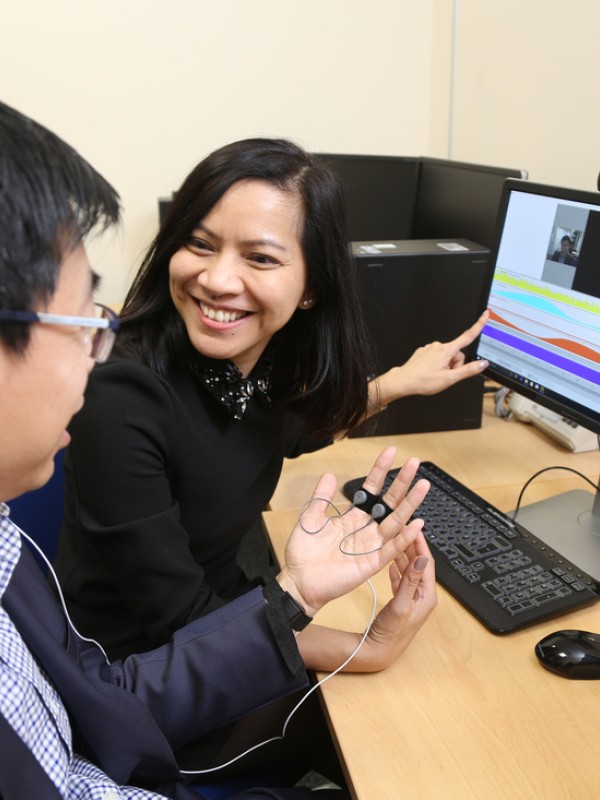
School of Hospitality and Tourism Management
This course is taught by academic staff from the School of Hospitality and Tourism Management.
Course structure Open
The structure of our programmes follows clear educational aims that are tailored to each programme. These are all outlined in the programme specifications which include further details such as the learning outcomes:
International Tourism Management MSc
Modules listed are indicative, reflecting the information available at the time of publication. Modules are subject to teaching availability, student demand and/or class size caps.
The University operates a credit framework for all taught programmes based on a 15-credit tariff.
Course options
International tourism management.
This module provides students with an insight into this dynamic and fast-growing industry and its ecosystem. The module examines the influence of business environment, investigates roles of each stakeholder in the tourism value chain system, analyses characteristics of each sector/business and explores the function of management within the tourism industry. The module highlights the impacts of the tourism industry on the physical environment, society and economy using real world case studies.
RESEARCH METHODS
The Research Methods module aims to help students to develop an understanding of the research process and prepare students to undertake research leading to successful completion of their dissertation. It enables students to conduct research independently and also provides them with the knowledge, skills and understanding required to develop their proposal for their dissertation. Students are required to identify an area of research and develop research questions to be answered or hypotheses to be tested in the industry context relevant to their course of study. The module covers ideas, techniques, and methods relevant to different stages of the research process, stressing the interdependence of each stage in conducting effective, coherent and rigorous research.
SERVICES MARKETING FOR EVENTS, TOURISM AND HOSPITALITY
This module is designed as an introduction to marketing. The module is divided into two distinct elements, firstly the principles of marketing are covered, and secondly the industry specific application of marketing is analyzed. The module also creates an opportunity to facilitate 'real life' decision-making and enhances a wide range of study skills, such as independent research, analytical skills as well as critical thinking. As such the goal is to contribute to resourcefulness and resilience and to develop digital capabilities linked to the topics covered. Consequently, students develop skills relevant for employability.
OPERATING SYSTEMS & SUSTAINABILITY
This module is designed to provide students with an understanding of how tourism and hospitality operations function systematically. The systems approach adopted will enable students to critically analyze the interrelationships between systems theory, systems design and systems analysis in tourism and hospitality businesses. This approach will facilitate a critical appraisal of the sustainability and effectiveness of operational types and an evaluation of the potential for improvement. For those students with a background in tourism and hospitality, this module will provide a sufficiently distinct approach for them to gain new insights while offering students without any prior knowledge a framework to facilitate their understanding of new material
TOURISM SOCIAL SCIENCE
This module is intended to explore the principles and concepts of tourism from the perspective of social science theories. The module covers a range of social science disciplines with a view to developing students’ multi-disciplinary social science approach to understanding the significance and role of tourism in contemporary society.
STRATEGY AND INNOVATION IN THE TOURISM ECOSYSTEM
This module aims to develop students' ability to explore and evaluate concepts and applications of strategy and innovation in tourism management and operations. It aims to explore strategic innovation as a dimension of the overall strategic management of a firm/destination where innovation is embedded in comprehensive attempts to maintain competitiveness. It is designed to explore real world case studies of innovation as a strategic approach applied by organisations and policymakers at global, national and destination levels and at different managerial and strategic climates. The module will equip students with the critical skills to evaluate the successful/unsuccessful implementation of tourism strategy and innovation.
ETHICS AND CSR
This module introduces students to the study of ethics and applies this to tourism, transport, hospitality and events. Within the last decade significant attention has been paid to the issue of ethics and sustainability in these industries. Issues such as: corporate social responsibility, global reporting, ethical consumption, to name but a few, are becoming increasingly central to business practice. This module will offer students the opportunity to reflect upon their own understanding of ethics and corporate responsibility. It will introduce them to a range of theoretical approaches to understanding ethics and ethical responses to business situations, as well as provide the opportunity for in-depth reflection and critique on ‘real life’ scenarios. In so doing, this module adopts the University's curriculum framework, which aims to develop learners with strong Global and Cultural capabilities, Sustainability, Resourcefulness and Resilience while enhancing their Employability and Digital capabilities.
ACCOUNTING & FINANCE FOR THE SERVICE INDUSTRY
Managers in the service industry need to be able to measure and analyse the financial, social and environmental performance of the business to underpin decisions in the management and investment setting. In this module, students will learn how to critically evaluate financial information and data available in annual reports, financial analysts’ reports and other relevant sources. Using the principles and practices of financial analysis offered in this module, professionals in the service industry will be able to continuously optimise their firm's performance and enhance the profitability of investment decisions.
VISITOR ATTRACTION MANAGEMENT
Visitor attractions are a key element of the tourist experience and a major element of a tourist destination. This module explores types of visitor attractions, identifying key attributes of each type and the management of visitor attractions worldwide using extensive real-world case studies. This module also investigates the functional management of visitor attractions, managing impacts of visitor attraction management on local environment, society and economy and taking into consideration ethical issues in visitor attraction management and risk management and the application of technology and innovation in visitor attraction management.
CONTEMPORARY ISSUES IN SUSTAINABILITY
Sustainability has become a major issue in contemporary service operations, including in the hospitality, tourism, transport, events, and related sectors. However, managers do not necessarily understand the specific aspects of sustainability which their business has an impact upon or is impacted by. Further, managers are not always familiar with the tools of sustainability assessment and have limited comprehension of how a robust sustainability audit can aid in reducing operational costs, improving corporate image, and increasing customer patronage. This module will introduce students into the array of sustainability-related issues that a business in hospitality, tourism, transport, or events may face and explain how these issues can be identified and assessed. The module will provide students with an opportunity to undertake a sustainability audit of a business and reflect upon the challenges of such audit¿s undertaking.
DESIGNING DIGITAL SERVICES
This module aims to provide you with a number of service design techniques and models by which current and cutting-edge digital technologies can be designed into existing and new service journeys, therefore delivering service innovation through design and technology to create business value. You will be exposed to research-informed, practice-relevant teaching and a series of innovative design workshops using emerging service science and service logic thinking to help develop innovative digital solutions or improve current ones to address current managerial and sustainability issues.
BUSINESS ANALYTICS IN SERVICES
Corporations, governments, entrepreneurs, and various organisations around the world are using data to extract patterns and generate insights to support strategic decision-making and create innovative solutions to business problems. This module will equip you with the fundamental concepts and tools needed to understand the emerging role of visual analytics in service organisations, will show you how to use a leading business intelligence platform -Tableau-, and will inform you how to best communicate your data with industry professionals for making better business decisions. Emphasis will be placed on applications, concepts, visualisation, interpretation, and communication of results, rather than theory and calculations.
BUSINESS PLAN
Students will have the opportunity to learn about the different approaches that aim to answer the question: how do I plan, assess and implement a new business venture? Business plans are essential not just for the successful implementation of start-up ventures, but also for continued business growth, including strategic competitiveness. A good business plan underpins business success on all levels and becomes a major guideline to sound management practices. All students will find much value in the business principles inherent to the planning process, which will lead to an enhanced commercial understanding. This module¿s content and outcomes build solidly upon undergraduate business-related courses from level 4, 5 and 6, as well as any accumulated business experience. It doesn't just reiterate much of the theory previously learnt, but also applies it in a create and innovate way to emphasise creative business development, profitability, growth, and sustainability. It holistically addresses preferred business outcomes and brings all its components together. This module is also designed to give students an entrepreneurial- and industry-focused alternative to the traditional academic dissertation (MANM387).
Semester 1 & 2
Dissertation.
The dissertation is optional for all MSc programmes and is the final element of the programme, providing an opportunity for a sustained period of independent study and research. It allows students to concentrate on topics that are of particular interest to them and it draws upon a range of different aspects of the taught programme particularly the Research Methods module (MANM386). Students can build upon their knowledge and topics learnt from programme-specific modules studies in semester 1 to develop and define their research idea and questions. It also gives an opportunity for students to work independently with an individual supervisor. There are two forms of dissertations: An academic dissertation. This form of dissertation follows the standard academic pattern of identifying a topic arising from a gap in the literature and developing a methodology to explore this area in-depth. A business or applied dissertation. This form of dissertation starts with an emerging business problem, either provided by an industrial partner or with their co-operation in the process, and seeks to provide a research-based solution to or exploration of the problem. All forms of the dissertation seek to develop the same learning outcomes and follow the same assessment criteria. In some cases, taught modules, in addition to Research Methods, may be pre-requisites of taking a particular form of dissertation so that students are adequately prepared.
Across academic years
General course information, contact hours.
Contact hours can vary across our modules. Full details of the contact hours for each module are available from the University of Surrey's module catalogue. See the modules section for more information.
New students will receive their personalised timetable in Welcome Week. In later semesters, two weeks before the start of semester.
Scheduled teaching can take place on any day of the week (Monday – Friday), with part-time classes normally scheduled on one or two days. Wednesday afternoons tend to be for sports and cultural activities.
View our code of practice for the scheduling of teaching and assessment (PDF) for more information.
Stag Hill is the University's main campus and where the majority of our courses are taught.
Career opportunities Open
We offer careers information, advice and guidance to all students whilst studying with us, which is extended to our alumni for three years after leaving the University.
Our MSc in International Tourism Management will provide you with the essential skills and knowledge needed for a successful career in industry.
95 per cent of our School of Hospitality and Tourism Management postgraduate students go on to employment or further study (Graduate Outcomes 2023, HESA).
Some of our graduates have gone on to start their careers in the following roles:
- Conference services and facilities manager
- Hotel manager
- Senior executive (in destination management services)
- Senior manager (in international tour operators and travel businesses)
- Marketing executive (in destination management organisations).
Read more about which careers our recent graduates have gone onto after leaving Surrey.
Hear from our students Open

Yasmine Fofana
Student - International Tourism Management MSc
"I have learned so much more about the tourism industry in the world. Learning more about it has definitely shaped my views about my long term career plans and my view on the world."
Entry requirements Open
Country-specific qualifications, international students in the united kingdom.
A minimum of a 2:2 UK honours degree, or a recognised equivalent international qualification.
We may be able to take relevant work experience into consideration if you don't meet these requirements. If you have at least one year of relevant experience in a full-time graduate-level role (or a minimum of two years’ experience in a relevant graduate-level part-time role) please provide full details of your role and responsibilities in your personal statement and CV when you submit your application.
English language requirements
IELTS Academic: 6.5 overall with 6.0 in each element.
These are the English language qualifications and levels that we can accept.
If you do not currently meet the level required for your programme, we offer intensive pre-sessional English language courses , designed to take you to the level of English ability and skill required for your studies here.

International Pre-Masters
Prepare for postgraduate study and boost your career prospects. This is an intensive programme of academic subjects, study skills and English language preparation designed to help you succeed.
Recognition of prior learning
We recognise that many students enter their course with valuable knowledge and skills developed through a range of ways.
If this applies to you, the recognition of prior learning process may mean you can join a course without the formal entry requirements, or at a point appropriate to your previous learning and experience.
There are restrictions for some courses and fees may be payable for certain claims. Please contact the Admissions team with any queries.
Fees and funding Open
Fees per year.
Explore UKCISA’s website for more information if you are unsure whether you are a UK or overseas student. View the list of fees for all postgraduate courses.
September 2024 - Full-time - 1 year
- These fees apply to students commencing study in the academic year 2024-25 only. Fees for new starters are reviewed annually
- Annual fees will increase by 4% for each subsequent year of study, rounded up to the nearest £100, subject to any overriding applicable legislative requirements.
Payment schedule
- Students with Tuition Fee Loan: the Student Loans Company pay fees in line with their schedule (students on an unstructured self-paced part-time course are not eligible for a Tuition Fee Loan).
- Students without a Tuition Fee Loan: pay their fees either in full at the beginning of the programme or in two instalments as follows:
- 50% payable 10 days after the invoice date (expected to be early October of each academic year)
- 50% in January of the same academic year.
- Students on part-time programmes where fees are paid on a modular basis: cannot pay fees by instalment.
- Sponsored students: must provide us with valid sponsorship information that covers the period of study.
The exact date(s) will be on invoices.
Additional costs
- Visits to attractions (including local travel and entry fees): £100
- Optional Field Trip (including local travel and accommodation): £120
- UK-based activity : £40.
Grand total: £260.
You may be able to borrow money to help pay your tuition fees and support you with your living costs. Find out more about postgraduate student finance .
Scholarships and bursaries
Discover what scholarships and bursaries are available to support your studies.
Early payment discount - Postgraduate September
This is an automatic award of £2,000 for self-funded international fee-paying students who pay their deposit by the deadline stated on the s...
Vice Chancellor’s Future Leaders Award
This prestigious award recognises academic excellence and is awarded to selected students starting a degree at the University of Surrey in S...
Apply online
To apply online first select the course you'd like to apply for then log in.
Select your course
Choose the course option you wish to apply for.
Create an account and sign into our application portal.
Full-time, 12 months, September 2024
Please note that we may have to close applications before the stated deadline if we receive a high volume of suitable applications. We advise you to submit your application as soon as it is ready.
Admissions information
Once you apply, you can expect to hear back from us within 14 days. This might be with a decision on your application or with a request for further information.
Our code of practice for postgraduate admissions policy explains how the Admissions team considers applications and admits students. Read our postgraduate applicant guidance for more information on applying.
Related courses
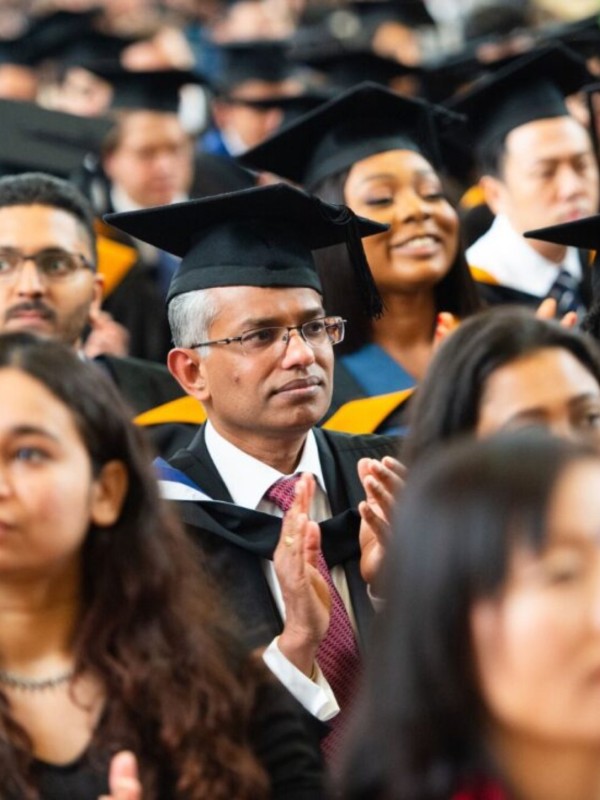
Air Transport Management MSc
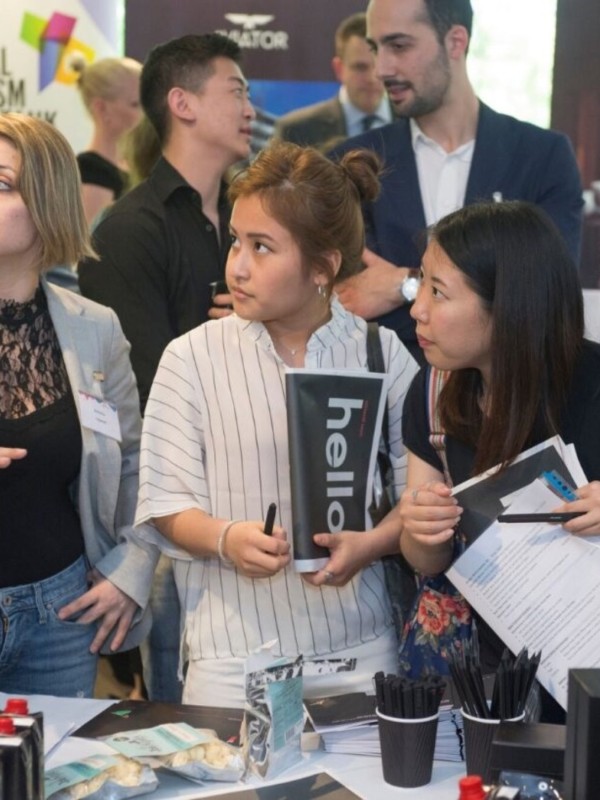
International Events Management MSc
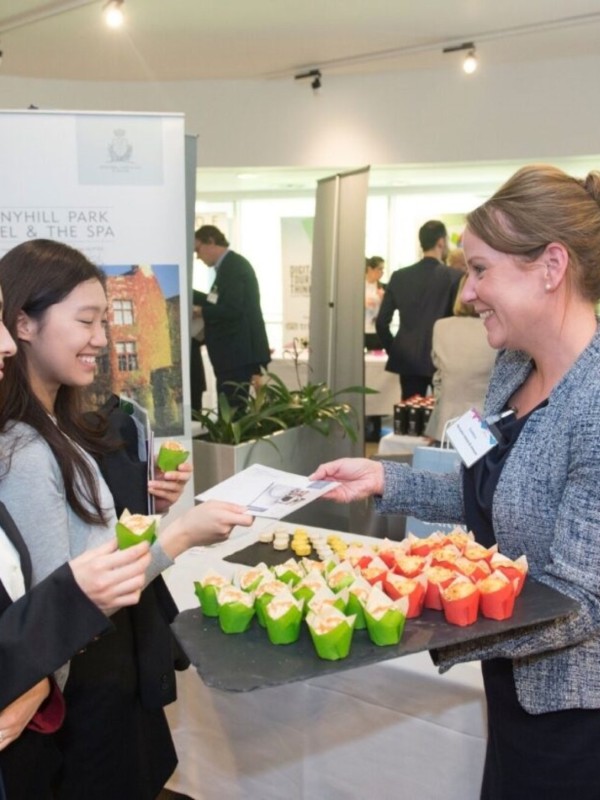
International Hotel Management MSc
About the university of surrey.

Accommodation
We have a range of housing to suit all requirements and budgets. There are more than 6,000 rooms available (en-suite, single-sex, studio flat, shared or single).

Student life
At Surrey we offer a friendly university campus set in beautiful countryside, with the convenience and social life of bustling Guildford on your doorstep.
Need more information?
Contact our Admissions team or talk to a current University of Surrey student online.
Terms and conditions
When you accept an offer to study at the University of Surrey, you are agreeing to follow our policies and procedures , student regulations , and terms and conditions .
We provide these terms and conditions in two stages:
- First when we make an offer.
- Second when students accept their offer and register to study with us (registration terms and conditions will vary depending on your course and academic year).
View our generic registration terms and conditions (PDF) for the 2023/24 academic year, as a guide on what to expect.
This online prospectus has been published in advance of the academic year to which it applies.
Whilst we have done everything possible to ensure this information is accurate, some changes may happen between publishing and the start of the course.
It is important to check this website for any updates before you apply for a course with us. Read our full disclaimer .
Our cookies
We use cookies for three reasons: to give you the best experience on PGS, to make sure the PGS ads you see on other sites are relevant , and to measure website usage. Some of these cookies are necessary to help the site work properly and can’t be switched off. Cookies also support us to provide our services for free, and by click on “Accept” below, you are agreeing to our use of cookies .You can manage your preferences now or at any time.
Privacy overview
We use cookies, which are small text files placed on your computer, to allow the site to work for you, improve your user experience, to provide us with information about how our site is used, and to deliver personalised ads which help fund our work and deliver our service to you for free.
The information does not usually directly identify you, but it can give you a more personalised web experience.
You can accept all, or else manage cookies individually. However, blocking some types of cookies may affect your experience of the site and the services we are able to offer.
You can change your cookies preference at any time by visiting our Cookies Notice page. Please remember to clear your browsing data and cookies when you change your cookies preferences. This will remove all cookies previously placed on your browser.
For more detailed information about the cookies we use, or how to clear your browser cookies data see our Cookies Notice
Manage consent preferences
Strictly necessary cookies
These cookies are necessary for the website to function and cannot be switched off in our systems.
They are essential for you to browse the website and use its features.
You can set your browser to block or alert you about these cookies, but some parts of the site will not then work. We can’t identify you from these cookies.
Functional cookies
These help us personalise our sites for you by remembering your preferences and settings. They may be set by us or by third party providers, whose services we have added to our pages. If you do not allow these cookies, then these services may not function properly.
Performance cookies
These cookies allow us to count visits and see where our traffic comes from, so we can measure and improve the performance of our site. They help us to know which pages are popular and see how visitors move around the site. The cookies cannot directly identify any individual users.
If you do not allow these cookies we will not know when you have visited our site and will not be able to improve its performance for you.
Marketing cookies
These cookies may be set through our site by social media services or our advertising partners. Social media cookies enable you to share our content with your friends and networks. They can track your browser across other sites and build up a profile of your interests. If you do not allow these cookies you may not be able to see or use the content sharing tools.
Advertising cookies may be used to build a profile of your interests and show you relevant adverts on other sites. They do not store directly personal information, but work by uniquely identifying your browser and internet device. If you do not allow these cookies, you will still see ads, but they won’t be tailored to your interests.
MSc International Tourism and Events Management
Glasgow caledonian university, different course options.
- Key information
Course Summary
Tuition fees, entry requirements, similar courses at different universities, key information data source : idp connect, qualification type.
MSc - Master of Science

Subject areas
Events Management Tourism Management
Course type
Tourism and events are among the fastest-growing sectors in the global economy* with destinations adopting event-led tourism strategies as a means to enhance location awareness and reputation and to bring about positive social and economic impact. This is an exciting time for events specialists and tourism specialists to combine their skills and become part of this movement.
Informed by industry demand and the vast array of job opportunities available, Glasgow Caledonian University's MSc International Tourism and Events Management programme delivers the practical and technical experience that you need to maximise the opportunities this growing sector has to offer.
You'll enjoy a truly international experience, with the chance to network, volunteer and work in industry with guest lectures from those currently leading in this sector.
Assessment methods
With a focus on the importance of both individual and collaborative academic work, your assessments have been designed to give you the opportunity to learn key academic skills including research, analytical skills, communications, cultural awareness and sensitivity, creative and problem solving skills, and critical skills, among many others. Developing these skills through assessment ensures that during your time studying the programme your ability to operate in the global business community is enhanced by building confidence and developing a culture of integrity and responsibility that modern global organisations look for in graduate employees.
Graduate opportunities
The tourism and events sector is a huge employer with a vast array of job opportunities around the world. The programme has been developed alongside industry so that our graduates are in demand and industry ready. Our tourism and events graduates have gone on to succeed in a range of organisations specialising in events management, insights and research and destination marketing.
UK fees Course fees for UK students
For this course (per year)
International fees Course fees for EU and international students
UK honours degree 2:2 (or equivalent) in any subject area.
Event Design and Management MA
University of westminster, london, international hospitality, event and tourism management msc, oxford brookes university, global events management msc, events project management - msc/pgd/pgc, cardiff metropolitan university, msc events management, bournemouth university.

BA (Hons) International Tourism and Events Management
270,866 students enrolled
At a glance
Course title, study method.
1st & 2nd year Online 3rd & 4th year on campus
Glasgow Caledonian University
Course duration, course level.
The international tourism and events sector has witnessed phenomenal growth and significant change in recent years. With global opportunities and a range of career choices, there has never been a more exciting time to pursue a career in international tourism and events management. Our programme develops your cultural understanding of events and tourism, and how they impact on society and the environment. You will be equipped with business and management knowledge incorporating an international perspective.
This includes planning, marketing, and staffing through to risk assessment and securing funding to create, manage and deliver successful events and tourism initiatives. You will benefit from interactive and hands-on learning experiences, collaborating with businesses using social media, wikis and blogs, providing you with practical skills that you can carry forward into your career. You will also benefit from industry speakers, field trips and real-life business simulations that will provide you with networking opportunities, key insights and a competitive edge on entering the industry.
The Moffat Scholarship Awards, Moffat student scholarship funding of �3600 per year, is open to students of this course. The Moffat Scholarship awards support students pursuing a career in the travel, tourism or events industries. Since 1998, more than 300 GCU students have benefitted from the generous fund established by the Moffat Charitable Trust. In addition to financial support, Moffat Scholarship Award winners also have the opportunity to gain valuable work experience and enhance their CV working within The Moffat Centre, the UK s largest university-based consultancy and research centre for tourism and travel market research and business development.
Entry to the University Programme is open for students who have accomplished the SCQF Levels 7 & 8 or the International Graduate Programme at ISDC Academy. Note: The Undergraduate Diploma comprises the ISDC International Certificate in Business and the ISDC International Specialised Diploma in Business qualifications which have been credit rated by the National Qualifications Framework (NQF) of Scotland at Levels 7 & 8 respectively on the Scottish Credit and Qualifications Framework (SCQF) with 120 allocated SCQF credits at each level. Both qualifications enable students to progress to relevant undergraduate programmes of study in compliance with the entry requirements of individual universities in the UK with Credit Exemptions. In addition, both qualifications are at Level 5 of the European Qualifications Framework (EQF).
Course Fee Structure
Course syllabus, scqf level 7 international certificate in business.
Principles of Business Management
Marketing Management
Personal and Professional Development
Talent Management
Business Economics
Fundamentals of Business Accounting
SCQF Level 8 International Specialised Diploma in Business Management
Core Modules
Business Analytics for Decision Making
Business and Professional Ethics
Change Management
Accounting and Financial Management
Financial Management
Financial Accounting and Reporting
Financial Modelling
Financial Technology
Global Marketing Strategy
Digital Marketing
Social Media Analytics
Brand Management
Human Resource Management
Managing Organisational Behavior
International Human Resource Management
Contemporary Employment Relations
Leadership: Theory and Practice
International Business Management
Entrepreneurship, Innovation and Commercialisation
Entering New International Markets
Tourism and Hospitality Management
The Contemporary Tourism and Hospitality Industry
Operations Management in Tourism and Hospitality
Managing Customer Relations and the Customer Experience
Emerging Challenges in Tourism and Hospitality
Healthcare Management
Human Resource Management in Healthcare
Process and Operations Management in Healthcare
Quality Control and Improvement Management in Healthcare
Service Users and Client Management
Project Management
Principles of Project Management
Project Planning
Project Financing and Risk Management
Project Quality Management
General Business Management
Leadership: Theory and Practices
Based on university module during the time of entry
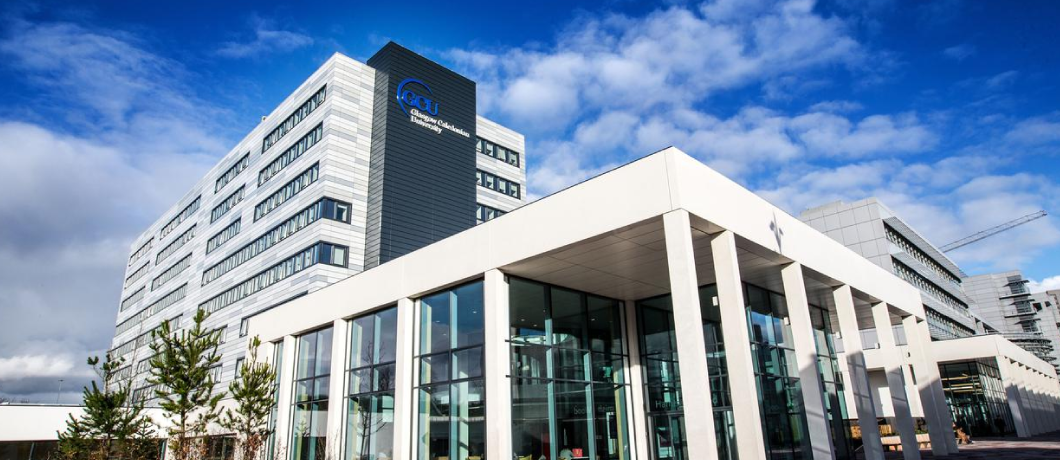
Ranked 52nd in The Guardian - University Rankings, the Glasgow Caledonian University is a public university located in Glasgow. The records of the University date back to 1875. The Queen's College, Glasgow 1975 was formed from previous institutions, which eventually merged with Glasgow Polytechnic to create the current Glasgow Caledonian University.
GCU has been recognised as a UK leader in championing social mobility and also the first university in Scotland to achieve EcoCampus Platinum certification for its environmental practices. With 17,000 students, the University has been formally recognised for its commitment to promoting gender equality by attaining the Equality Challenge Unit's prestigious Athena SWAN Institutional Bronze Award.

Download Brochure
Share to social media.
- Share to Facebook
- Share to Twitter
- Share to LinkedIn
Enquire Now
Your enquiry has been submitted successfully..
Our counselor from the respective University will get in touch with you.
Schedule a Meeting with Alex
Virtual open evening.
Ready to kickstart your career by gaining an undergraduate degree from top universities in the UK and around the world at an affordable price? Find out more by registering for our virtual open day on the 18th May at 11:00 or 17:00 BST. During this interactive session, you’ll learn more about our qualifications and studying with us – plus our friendly team will be on hand to answer any questions you might have about studying. Sessions will last up to 45 minutes and will cover:. • A short presentation on who we are • A discussion about the qualifications we offer and your path to gaining a degree • An opportunity to meet some of the team and tutors • A chance to chat with one of our university partners • Q&A session Register your place below! De Montfort university Leicester will kindly be joining us for our 11:00 BST session and the University of Portsmouth will be joining us for our 17:00 BST session.
Please select the course year you would like to view...
- International Hospitality, Tourism and Events Management
International Hospitality, Tourism and Events Management - BA (Hons)
This BA in (Hons) International Hospitality, Tourism and Events Management course will provide you with the business management skills and practical expertise that the best employers in international hospitality, tourism and events are looking for.
The experiential nature of this course will equip you with excellent management skills and the practical expertise needed to succeed in these vibrant industries, which will put you at the forefront of graduates, and open doors to a wealth of career opportunities.
- Be part of a Business School that aims to provide you with an exceptional teaching and learning experience designed to help you succeed: The Queen Margaret Business School courses provides students with hands-on experiential learning (placements), provides the optimum balance of theoretical and practical approaches, and has strong industry links. We recognise the need for ethical, social and ecological responsibility in business, and our courses also offer an entrepreneurial focus. Our Business School is a member of the Chartered Association of Business Schools and we are a signatory member of The Principles for Responsible Management Education (PRME) .
- Develop real world skills : This exciting new course enables students to develop real world professional skills that hold lasting value in the hospitality, tourism and events industry and beyond
- Nurturing your soft skills: We celebrate and nurture critical soft skills that are now so highly valued by employers across all sectors, specifically - resilience, teamwork, problem solving, adaptability, work ethic and leadership
- Range of employment opportunities : In offering a broader range of study areas within one degree, compared with other courses, students can begin to future-proof themselves by having flexible skills and knowledge applicable to a range of employment sectors.
- Excellent support from staff: Smaller class sizes mean you will enjoy more personal engagement with lecturers. We will know you by name and help manage your learning from your first lecture to graduation.
- Staff experience and course relevance: You will be taught by active academics who are doing research in their own right. Some colleagues have recently completed their doctoral studies, and others are publishing in mainstream academic journals. Such engagement is key to the relevance of our courses, and helps equip staff and students with the background to make intelligent decisions about their future.
- Practical experience: The 20-week internship will give you the optimum balance of practical and theoretical learning and boosts your employability.
- Opportunities, awards and scholarships: Various funds will be available to help individuals take part in extra-curricular activities across the four-years. Funds also enable class trips to a range of visitor attractions and events and perhaps even taste the produce on a brewery and distillery tour as part of your studies at QMU.
- Experience: QMU has over 125 years of teaching expertise in hospitality.
- Location and employment opportunities: As a capital city and top tourist destination, and one of the most famous events' cities in the world, Edinburgh offers many opportunities for part-time employment as a student and your career beyond graduation.
- Industry links: We have strong links with industry in Edinburgh and further afield. We regularly host guest lectures, either physically on campus or virtually, featuring experts from across the UK and even as far as the Caribbean. This not only enhances our teaching by offering you a well-rounded learning experience, but also provides you with networking and career opportunities.
- High ranking: QMU is ranked in the top 4 of Scottish Higher education institutions for Hospitality, Event Management & Tourism in the Guardian University Guide 2024.
Why study this course?
Queen Margaret Business School - Hands on Experiential Learning:
International Hospitality, Tourism and Events Management - BA (Hons): The course in brief
The hospitality, tourism and events sector has experienced significant growth in recent decades, emerging as a significant contributor to both the Scottish and global economy, accounting for 1 in 10 jobs worldwide and supporting a substantial number of enterprises. The events sector in particular has undergone remarkable expansion over the last 20 years, encompassing everything from pop-up food fairs to high profile corporate events, trade shows and our own world-famous Edinburgh festivals. While hospitality, tourism and events can be viewed as separate industries in some ways, they are also deeply interlinked in others, and throughout your course you will deepen your understanding of this through experiential learning, enabling you to put theory into practice. This involves the creative planning, delivery, and execution of live events, participating in a group walking tour, leading live business consultancy among other activities. Moreover, your 20-week paid industry internship will equip you with real-life experience that is sure to boost your employability.
Our location in Edinburgh is sure to enrich your learning experience: Known as “the festival city” and one of the world’s top tourist destinations, you have an abundance of hospitality and events venues right at your doorstep, which provide numerous opportunities for internships, field trips to distilleries and a wide range of other attractions, as well as part-time work and graduate career opportunities. You will also benefit from guest lectures from some of Scotland’s major tourism, hospitality, and events players.
On this course you will:
- gain a thorough theoretical understanding of the political, economic and social factors at work in the industry, and what they will mean for you as a manager of the future;
- learn hands-on how to manage money, resources and talent in the fast-moving hospitality, tourism and events environment;
- plan and deliver live events;
- go on a 20-week paid internship that will boost your employability; and
- acquire the skills to work in exciting and vibrant sectors of increasing importance and relevance to a modern and socially just society.
How will I be taught?
All students enrol onto the honours degree, but you can choose to exit with an ordinary degree after three years.
Teaching, learning and assessment
You will be taught in lectures, seminars and practical workshops. You will engage in practical, hands-on experience at every level of your studies. Outside these timetabled sessions you will be expected to continue learning through self-study. You will be assessed by a variety of methods during each semester.
Placement (Internship)
You will complete a 20-week internship in Year Two, in the UK or overseas. Academic staff will help you prepare for this invaluable real-world experience, and we will set up interviews on campus to make finding the perfect host organisation as straightforward as possible.
In the past, our students have undertaken internships in a diverse range of roles and with a multitude of businesses. Examples include acting as front of house at the Balmoral Hotel's One restaurant, contributing to the events departments of the Renaissance private member's golf club in Archerfield, adopting the role of an events planner for the tourism, events, and cultural department of the city of Vannes in France, and engaging in various responsibilities within HR departments across the UK, Europe, and the USA. These internships can be transformative experiences for our students, as exemplified in these testimonials:
“I'm very grateful for this experience, I have learnt so much, met some amazing people and gained connections within the industry I want to work in, which opens up a lot of opportunities for me for the future.”
“I'm very happy with my internship and what I've learned and I'm still in contact with them. It also confirmed my career choice and that I'd really like to work in events/tourism and marketing.”
Several bursaries and scholarships are available to help with costs, such as the Moffat Trust, the Santander Universities Mobility Fund, the Vice-Chancellor’s & Student Development Fund or the Susan Smith IHTEM Student Development Fund.
Exchange opportunities
Studying abroad through our exchange programme can be one of the most exciting and rewarding challenges for a student to experience. The opportunity to travel and live in another country, learn different customs and traditions, meet new people and future career draws many students into the exchange programme. In Year Three, you will have the opportunity to study overseas (subject to availability) for one semester. For more information, visit Exchanges and Study Abroad .
Teaching staff, class sizes and timetables
You can read more about the teaching staff on this course at the bottom of this page. Please note that teaching staff is subject to change.
For more information, please also visit ‘ How we teach and how you’ll learn ’.
What will I learn each year?
- explore the key concepts that are the foundation of hospitality, tourism and events. Additionally, you will undertake a range of introductory modules around business management, for example, marketing and finance. The combination of theoretical concepts and the inclusion of practical and vocational skills prepares students for real-life situations;
- visit sites and venues that will enhance your experience and understanding, and guest lectures by leading industry figures will bring your learning to life; and
- engage with practical and vocational skills including food service and preparation and group leadership to prepare for the planning and delivery of a live event: culminating in a live event with our partner Edinburgh New Town Cookery School.
- Introduction to Hospitality, Tourism and Events
- Introduction to Management and Leadership
- Marketing and Consumer Behaviour
- Global Impacts and Trends in Hospitality, Tourism and Events
- Introduction to Finance and Accounting
- Producing a Live Food Event
- prepare for a challenging and rewarding paid 20-week internship of your choice, in the UK or overseas, during which time you will be supported by the University;
- develop skills to think critically about hospitality, tourism and events and the consumer experience; and
- focus on management skills, by studying, for example, human resource management.
- Managing Consumer Experiences in Hospitality, Tourism and Events
- Digital Marketing and Ecommerce Management
- Operations Management
- Internship for Hospitality, Tourism and Events
- Human Resource Management
- deepen your understanding of a range of management techniques to assist in your chosen profession;
- study specialist modules about the hospitality, tourism and events sector and their contributions to the economy and society in the pursuit of social justice, for example, the subject of sustainability and climate change, and will choose an elective on a subject in this year to support your learning; and
- create and project manage a live event of your choice, with the guidance of your lecturer;
- have the opportunity (subject to availability) to study for one semester at a university overseas. For more information, visit Exchanges and Study Abroad.
- Hospitality, Tourism and Events for Economic and Social Change
- People Planet Purpose
- Special Interest Hospitality, Tourism and Events or Business Management Electives
- Project Managing a Live Event
- Research Methods
- New Enterprise Startup
- complete a dissertation in an area of your choice and engage with current topics in hospitality, tourism and events;
- critically evaluate a range of contemporary issues such as crisis management within a hospitality, tourism and events context. There will also be an emphasis on the strategic issues and challenges within business management; and
- keep on developing practical skills by engaging in a live consultancy project with a hospitality, tourism or events business.
- Creative Solutions for Live Industry Problems in HTE
- Contemporary Issues in HTE
- Strategy
- Leading and Managing Change
- Dissertation
NB The modules listed here are correct at time of posting (Feb 2024) but may differ slightly to those offered in 2025. Please check back here for any updates.
This degree can provide an excellent stepping stone to the management training schemes of multi-national hotel groups, and towards junior management roles in areas such as food and beverage management, sales and marketing, HR, accommodation services etc.
Other graduates may choose to pursue careers in tourism management, either with tour operators, in national or local tourism bodies or at a variety of attractions.
Those most interested in events will find roles in festival and events management, arts management, event logistics, conference production, sponsorship management and charity fundraising, as well as with hotel groups.
Our students are in demand, with many securing employment directly through their internships, campus networking opportunities, and independently with the excellent support of our on-campus career services. Our previous graduates have achieved remarkable success, now holding positions with global brands, which include:
- Team Leader, Walt Disney World, Florida
- Assistant Manager, Marriott Hotel, Hong Kong
- HR Director, Dakota Hotels
- Various roles at Balmoral Hotel, Edinburgh
- Event Sales Manager, The Dome, Edinburgh
- Research Assistant, VisitScotland
- Three Chimneys, Skye
- Assistant Manager, Camera Obscura
- Mercat Tours, Edinburgh
Additionally, some have pursued postgraduate studies at QMU and other universities.
As hospitality, tourism and events are global industries, there are great opportunities for international travel at all career stages.
International Hospitality, Tourism and Events Management - BA (Hons): Entry requirements and application information
Entry requirements
Scottish Higher: Standard - BBBC, Minimum - BCCC
A Level: BCC
Irish Leaving Certificate: H2 H3 H3 H3
International Baccalaureate: 28 points
International: IELTS of 6.0 with no element lower than 5.5
Required subjects: Maths and English at Nat 5/GCSE level are preferred. We can also accept National 5 Application of Maths or Lifeskills at the same grade.
Am I a Widening Access student?: We apply the minimum entry criteria to applicants who meet one or more contextual factor. To see if this would apply to you, please refer to the access and application page.
Mature/Access: We welcome applications from mature students with relevant qualifications or experience. Visit our College Leavers and Mature Students Advice page for more information.
Direct Entry:
- HNC: HNC in a related subject with B in the graded unit
- Scottish Higher: BC at Advanced Higher in relevant subjects plus BB at Higher
- A Level: BBB in relevant subject
- HND in a related subject with CB in the graded unit
For details of related HNC and HND courses, visit our College Leavers and Mature Students Advice page
Disability/health conditions
If you have a disability, long-term physical or mental health condition, or learning disability, it should not stand in the way of your studying at QMU. However, if you are not sure whether your disability might be a barrier in your studies or in relation to the professional standards, please contact the disability service who will be able to have a conversation with you about reasonable adjustments and supports available to you.
Other costs
The additional costs associated with placement travel and accommodation are the responsibility of the student. Students who receive SAAS funding may be able to claim for some of these expenses to be reimbursed.
Terms and Conditions
- The delivery of this course is subject to the terms and conditions set out in our 2025/26 Entry Terms and Conditions (Undergraduate) .
- The course information on this page is correct at the time of posting (Feb 2024) but may differ slightly for 2025 entry. Please check back here for updates.
Awarding body
Hear Hospitality and Management expert commentator, Andrew McPherson
Want to be your best you? Study with QMU
Start Your Application
Course overview, engage with the team, opportunities to meet us: open days and more.
As well as open days, we offer campus tours and online events throughout the year to help you find out more about student life and studying at QMU.
Useful Links
- Queen Margaret Business School becomes a signatory of the United Nations Principles of Responsible Management Education (PRME)
Courses You Might Also Like
- BA (Hons) Business Management (Graduate Apprenticeship) (2025 entry)
- BA (Hons) Business Management (2025 Entry)
- BA (Hons) Business Management with Analytics (2025 entry)
- BA (Hons) Business Management with Digital Marketing (2025 entry)
- BA (Hons) Business Management with Finance (2025 entry)
- BA (Hons) Business Management with Human Resource Management (2025 entry)
Staff Profiles and Student Stories

Other Useful Information


INTERNATIONAL TOURISM MANAGEMENT
Ba (hons) / fda.
Accredited by the University of Warwick
Apply Ask us a question
- Undergraduate
- International Tourism Management BA (Hons) / FdA
Choose Award
4 years FT (3 years without placement)
1-year placement (BA only)
September, February
2 years full-time
Opportunities available
Discover more at our next open day
Saturday 29 June 2024
Course breakdown
Entry requirements, key information.
- Placements and Careers
£400K invested in our new Aviation and Tourism Suite, exposing you to sector-leading facilities
Opportunities for international study abroad tourism exchange programmes
A career in tourism, you can be part of an industry that has become a global phenomenon over the last 70 years. Many economies and businesses now rely on their ability to attract visitors, and international providers need to keep reinventing themselves in order to stay ahead of the curve in this evolving, uncertain and competitive environment.
Whether you want to work in areas ranging from tour operations and destination management organisations to attractions and events organisations, or even set up your own business, our International Tourism Management degree course at University College Birmingham will equip you with the vital industry skills and attributes to realise your career aspirations. Studying at a recognised Institute of Travel and Tourism (ITT) Centre of Excellence, you will learn how to analyse tourism trends and undertake real life industry projects in order to devise innovative, creative strategies to compete in the marketplace.
One of the major benefits of our four-year BA (Hons) International Tourism Management course is a 48-week paid work placement, giving you a significant and distinctive advantage in a competitive job market when you graduate. You will also go on a variety of residential visits both in the UK and abroad, while our range of optional modules will enable you to specialise your studies to match your interests and career aims.
Why should I choose this course?
- WORK PLACEMENT (BA only) – Boost your career prospects and first-hand industry experience with a paid 48-week placement - no additional tuition fees
- RESIDENTIAL VISITS – Take on tourism projects in the UK and overseas*, with essential trip costs covered by us – past destinations have ranged from Amsterdam, Barcelona and Prague to New York, Toronto, Cyprus and The Gambia (* subject to visa requirements )
- SPECIALISE YOUR STUDIES – Gain expertise related to your career aims via optional modules such as Attraction Management or Smart Tourism and Aviation
- INDUSTRY APPROVED – Study at an ITT Centre of Excellence and work on live and simulated industry projects in association with our professional networks
- NO EXAMS - If you are not keen on exams, this course is for you. Unlike many degrees in this field, you will have no written exams during or at the end of the course and will be assessed through practical assessments and coursework only
- AWARD-WINNING UNIVERSITY – Study at the highest-ranking university in the region according to student choice ( Whatuni Student Choice Awards 2023 )
Our facilities
Students on our tourism courses at University College Birmingham have access to outstanding simulation facilities in our brand new Aviation and Tourism Suite. Our learning spaces on campus also provide ideal environments to build your knowledge, from lecture theatres to interactive group working spaces and extensive library resources.
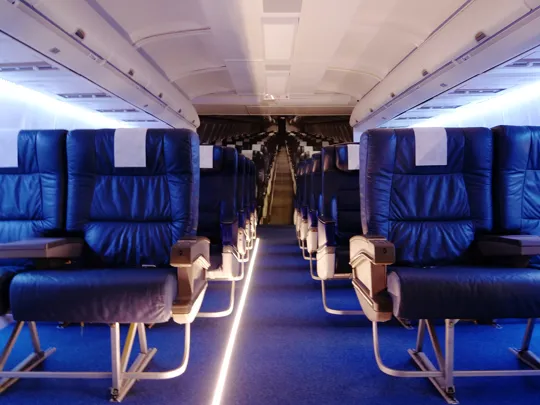
Our new Aviation and Tourism Suite features a state-of-the-art mock plane cabin, as well as check-in areas for training students
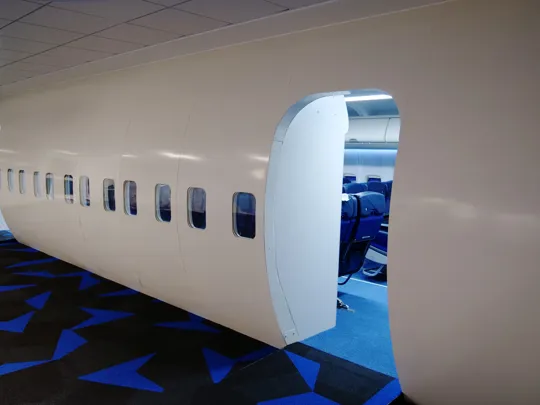
Aviation and Tourism Suite
Take a look around our Aviation and Tourism Suite that features exciting simulation facilities for students on our aviation, travel and tourism courses.
Find out more
Students on the FdA have the option of progressing onto the final year upon completion of the foundation degree.
Core Modules
Digital Tourism
Exponential growth in digital technologies over the last decade has had, and continues to have, a significant impact on the tourism industry. These developments have produced a range of digital tools that are used by the tourism industry to enhance the tourist experience, improve marketing methods and empower the consumer. All of these developments will be examined in this module and through a range of innovative activities, you will develop essential digital skills in preparation for future employability.
Successful Tourism Destinations
This module will examine the critical factors driving the success of destinations, which include connectivity, government support, local community engagement and the offer of an exciting product. In addition, you will review challenges facing destinations in terms of over-tourism, implementing sustainable policies and remaining competitive over the long-term.
Dynamic Tourism Environment
This module will examine the dynamic nature of the global tourism environment and the response strategies of tourism businesses. Critical themes include the changing nature of the tourism industry and consumers, safety and security, digital technology, the ability to travel ‘freely’ (or not) around the world and how businesses are striving to implement more effective sustainable tourism policies.
Employability and Professional Development
This module will encourage you to consider a range of career paths available to you within the aviation/tourism sectors. You will consider your skills and attributes by auditing your current abilities before mapping them against those you will seek to gain during your course of study. You will have opportunities to enhance your employability and professional skills through assessment scenarios.
Tourism Operations and Innovation
Providing a competitive visitor experience, while generating profits, is the ultimate performance goal for tourism operators. This becomes increasingly challenging in a very competitive and dynamic environment. Accordingly, tourism operators must seek innovative solutions to performance gaps to ensure long-term success. This module will examine the current practices of tourism operators in terms of revenue management, capacity management and offering an outstanding visitor experience.
Sustainable Tourism Practices
We face many global challenges that some experts believe will harm future generations, so we have to respond now. An active global movement is demanding that we deliver more sustainable and ethical practices across all industries, including tourism. This module will explore the key criteria for sustainability and the innovative practices employed by tourism businesses and destinations.
Industry Live Project
This module will be based on an industry consultancy project with a real client. The context of the project will be based on market or operational research that will support an organisation or destination’s overall performance. This is an excellent opportunity to obtain another form of industry experience and will support you with your career aspirations.
Plus one option from:
Revenue and Performance Management
The purpose of this module is to offer insight into the rationale behind the pricing decisions taken by tourism organisations. It will examine the key sources of revenue and costs typically faced by providers within the industry and how these are managed to achieve profitable outcomes. It ultimately aims to increase your employability by using up-to-date case studies and key industry metrics and financial statements to interpret and scrutinise financial results with improved fluency and confidence.
Attraction Management
This module will examine the range and changing nature of the attraction industry (from small heritage/cultural attractions to large attractions) and the challenges facing attractions within a very competitive environment. The module will showcase how attractions have implemented innovative strategies to enhance their overall operational performance while offering a more inclusive, accessible and diverse visitor experience.
Aviation Management
This module will guide you through the exciting world of aviation management, focusing on understanding the structure of the industry, how the skies are managed, how airports work and the relationship between airports, airlines and passengers. You will be introduced to airport operations, managing the passenger experience and to key Standard Operating Procedures (SOPs) in aviation.
Work placement
Work Placement (optional – for BA (Hons) students only)
You will gain valuable work experience on a 48-week work placement. This is an exciting opportunity to put what you have learned into practice, broaden your experience and demonstrate your abilities to potential employers.
Tourism Trends and Futures
This module will review the strategic challenges facing destinations as they strive for sustainable competitive advantage. Various macro forces continue to influence the strategic direction of destinations with new risks and opportunities arising. Destinations are implementing more inclusive and sustainable strategies to navigate their way through a more turbulent environment. But the question remains – can destinations successfully future-proof themselves from a more uncertain future?
Strategic Change Management
In an increasingly fast-paced and changing global environment, it is more important than ever that a business can navigate its way to a successful future. This module will evaluate different strategic change management tools in supporting businesses to seize new opportunities and treat risks/threats.
Independent Research Project
This module provides you with the opportunity to demonstrate your capabilities in researching, planning and delivering an industry-related project. You can either self-select your own topic or choose from a list of contemporary industry projects. This project focuses on cultivating the desired graduate attributes of professionalism, critical enquiry, problem solving, enterprise, creativity and innovation and in enhancing your professional profile.
Crisis Communications Management
In an increasingly turbulent and dynamic global environment, it is more important than ever that businesses and destinations can manage their reputation effectively. This module will examine a range of key public relations and reputation management principles and provide you with the knowledge and skills needed to plan a successful communication campaign (media and public relations) in response to a crisis. Using an omnichannel approach, you will explore the challenges and opportunities that different media channels bring. This will further increase your employability by providing you with experience of the working practices of corporate press agencies or departments.
Visitor Experience Management
This module will focus on how tourism destinations mediate, design and deliver exciting and memorable visitor experiences, while navigating their way through a range of sensitive, digital and ethical considerations.
Smart Tourism and Aviation
This module will explore the increasingly smart approaches taken by destinations and tourism/aviation providers within an increasingly connective and smart world. Challenges and opportunities will be explored across the industries.
The modules listed above for this course are regularly reviewed to ensure they are up to date and informed by industry as well as the latest teaching methods. On occasion, we may need to make unexpected changes to modules – if this occurs, we will contact all offer holders as soon as possible.
International Tourism Management BA (Hons)
A-levels : An A-level grade profile of CDD .
T-levels : A T-level graded Pass with a core component of grade C .
BTEC : A BTEC grade profile of MMP . This can be achieved from either an Extended Diploma or a combination of smaller BTEC qualifications.
Tariff : Other Level 3 qualifications are accepted at University College Birmingham for entry. A minimum of 80 UCAS Tariff points will be required.
Access to Higher Education Diploma : 80 UCAS Tariff points including a minimum of 15 Level 3 credits at Distinction.
International Tourism Management FdA
A-levels : An A-level grade profile of DD .
T-levels : A T-level graded Pass with a core component profile less than C .
BTEC : A BTEC grade profile of PP . This can be achieved from either an Extended Diploma or a combination of smaller BTEC qualifications.
Apprenticeship: Achieve an advanced apprenticeship (Level 3).
Tariff : Other Level 3 qualifications are accepted at University College Birmingham for entry. A minimum of 32 UCAS Tariff points will be required.
Access to Higher Education Diploma : 32 UCAS Tariff points.
Non-tariff: Non-UCAS Tariff-based Level 3 qualifications are also considered for entry. Please complete our enquiry form here to check your eligibility.
Work-based: We also give equal consideration to applicants who are currently in work and wish to apply to University College Birmingham. To apply, you must have a minimum of 3 years’ relevant work experience, demonstrating management or supervisory duties. Your application must also include a reference from your line manager supporting your entry to higher education. For further details, please contact Admissions.
International students
For academic and English entry requirements for EU and international students, please visit the Country Specific Information page. Please note: As an International Student, when choosing optional placement, a visa extension may be required.
Teaching and assessment
Note : Indicative information only – actual timetables and assessment regimes will be issued at your induction.
Example of a typical teaching week (up to 15 contact hours):
- Large group teaching – 4 hours
- Smaller group teaching – 5 hours
- Tutorials – 3 hours
- Academic and employability support – at least 2 hours
- Industry speaker sessions and employer fairs
- Field trips and visits
You will also need to commit around 20 hours per week for individual study time.
Estimated breakdown of assessment for this degree course:
- Coursework – 48%
- Practical assessment – 52%
Our teaching and assessment is underpinned by our Teaching, Learning and Assessment Strategy 2021-2024 .
Tuition fees
UK students
If you are a UK student enrolling on a standard-length Foundation Degree or a BA/BSc at University College Birmingham, your fee for this academic year will be £9,250. A half-year tuition fee is £4,625. There will be no change to this tuition fee for the forthcoming two academic years (2023/24 and 2024/25). View undergraduate fees
If you are an international student enrolling on a full-time foundation degree or a BA/BSc in 2023/24, your fee for this academic year will be £13,500 per year. T he course fee for academic year 2024/2025 is £14,000 per year.
If you complete a placement year, there will be an administration fee of £500 for a full year or £250 for a half-year placement.
View international fees
Kick-Start Scheme
As a new student studying this course full-time, you will receive £300 per year through our Kick-Start Scheme (UK students only, eligibility criteria applies). This scheme will support your studies and future career by contributing to course-related materials, uniform or selected items on campus. You may also qualify for an additional £500 per year.
Find out more about the Kick-Start Scheme here .
Unibuddy Community - meet other students on your course
Starting university is an exciting time, but we understand that it can sometimes feel a little daunting. To support you, you will be invited to join our Unibuddy Community , where you can meet other students who have applied for the same course at University College Birmingham, before you start studying here.
As soon as you have been made an offer, you will be sent an invitation email to complete your registration and join the Unibuddy Community. For more information, check out our Unibuddy Community page .
Latest updates
Join the conversation and check out the latest updates from our Department of Hospitality and Tourism.
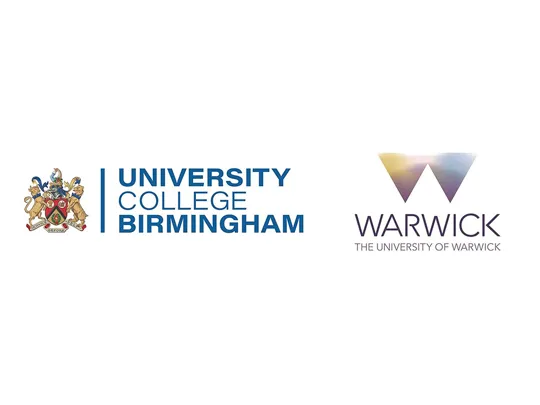
This course is accredited by the University of Warwick .
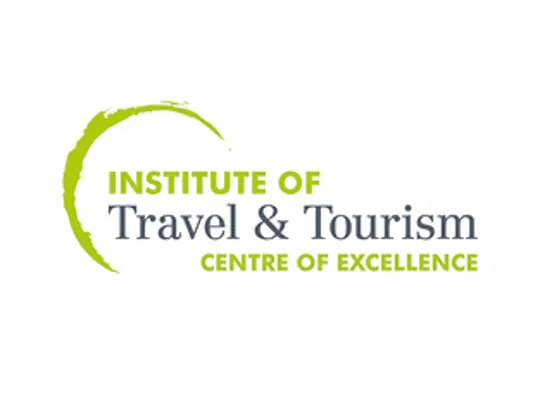
University College Birmingham is a recognised Institute of Travel and Tourism Centre of Excellence .
Accreditations, endorsements and partnerships
University College Birmingham works with a wide range of organisations to ensure you receive the best possible training and qualifications recognised by industry.
of graduate employers say relevant experience is essential to getting a job with them
Work placements
Work placements are vital for gaining real-life experience and for building your confidence and skills before you finish your course – and they may even lead to a job when you graduate. Our Hired team can help find the ideal placement for you.
Our four-year BA International Tourism Management course features a 48-week paid placement, during which you will not incur any tuition fees. Opportunities are available in the UK and overseas. (There is also the option to study the BA course without a placement. The placement is not included in the FdA.)
Work alongside experts in your sector
A snapshot of some of the employers we have worked with:
- Caro Hotel (Spain)
- Lisbon Bike Tour and Outdoors (Portugal)
- Coeur Des Montagnes (France)
- Brussels Marriott Hotel Grand Place (Brussels)
- Hilton Birmingham Metropole (Birmingham)
- Cherry Hills Country Club (USA)
- Hotel Alhambra Palace (Grenada, Spain)

So far, I mostly enjoy the seminars and lectures as they are all interesting and educational, my favourite module being Developing People in Tourism. Our lecturer makes sure we understand everything and involves us, asks us important questions, helps us with our assignments and points us in the right direction.
Petra Kohoutova International Tourism Management BSc (Hons) *Now BA (Hons)
Career opportunities
The example roles and salaries below are intended as a guide only.
Tour manager
Average Salary: £27,500
Tourism officer
Average Salary: £24,500
Marketing executive (graduate)
Average Salary: £37,500
Digital marketer
Average Salary: £30,000
Project manager (graduate)
Average Salary: £39,197
Product manager (graduate)
Average Salary: £37,582
Want to take your studies to the next level? Completing the BA (Hons) degree will enable you to move onto our postgraduate courses such as International Tourism Management MSc/PGDip , Hospitality with Tourism Management MSc/PGDip (Pathway A) or Global Meetings and Events Management MSc/PGDip .
We are here to support your career goals every step of the way.
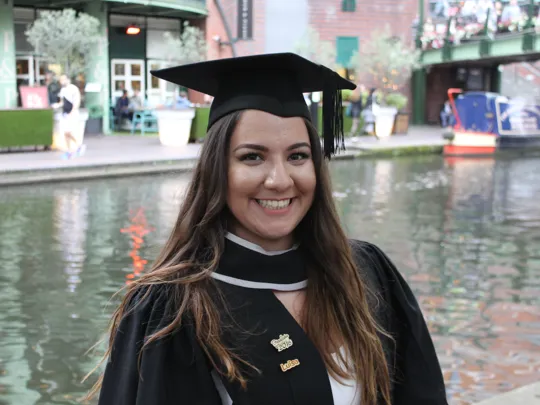
Luísa’s Story
Luísa is excelling in her career, currently managing an IT support team that ensures healthcare workers have critical data at their fingertips.
Course statistics
Meet your lecturers.

Prof Michelle Callanan
Deputy Dean (School of Business, Tourism & Creative Industries)

Kathryn Hayat (Associate Professor)
Head of Department (Hospitality and Tourism)

Paul Bamber
Senior Lecturer Tourism

Senior Lecturer

Karla Keating-Nel

Simon Faulkner

Valentina Basile

Yvonne Worrell

Take the next step...
Apply Book an open day
Other courses you may like
Aviation and airport management ba (hons) / fda.
Take off on an exciting international career by studying our Aviation and Airport Management course. Gain in-depth knowledge of how the aviation industry functions, with visits to national and international airports as well as a year-long placement to boost your experience.
International Tourism Management BA (Hons) Top-up
‘Top up’ your existing qualifications for a full BA (Hons) degree on our one-year International Tourism Management course. Enhance your knowledge through a range of specialist topics and gain unique industry insight studying at an ITT Centre of Excellence.
- Follow us on Facebook
- Follow us on Linkedin
- Follow us on Instagram
- Follow us on Tiktok
- Follow us on Youtube

MA Tourism, Hospitality and Event Management
The MA Tourism, Hospitality and Event Management will help you thrive in the world’s fastest-growing industries, broadening your understanding of the sector and giving you the skills to work in a globalised business environment.
As a truly global institution, BSBI is constantly striving to bring new opportunities and challenges to its students. Our mission is to help you grow in your studies and career whilst introducing you to the flourishing German and EU business world. Thus, in this course you will gain the practical knowledge and understanding needed for success in the tourism, hospitality and event management industry. Each module is designed to transform your approach by covering the latest trends and practical techniques of management, including business strategy, strategic marketing, project management and cross-culture leadership.

Berlin School of Business and Innovation is in partnership with University for the Creative Arts (UCA). As a result of this partnership, BSBI is able to offer the MA Tourism, Hospitality and Event Management programme. UCA is an acclaimed creative institution in the UK that ranks highly in all three of the major UK league tables. The university has also been ranked 13th out of all UK universities in the Guardian League Table 2020; and ranked no.7 in the 2021 Guardian League Tables for Business, Management & Marketing.
SECURE YOUR PLACE ON THIS PROGRAMME BY APPLYING TODAY.
Find out how to apply here, what will you experience.
Throughout the MA Tourism, Hospitality and Event Management programme, you’ll cover essential concepts of management, including business strategy, operations management, project management and cross-cultural leadership. You’ll also learn how to apply management and business concepts to the tourism, hospitality and event industries. As such, you’ll study business theories and their real-world application.
By the time you graduate, you’ll have developed problem-solving and decision-making skills, both of which are vital for successful management in the sectors.
In your final term, you’ll showcase your newly learned skills by carrying out research and preparing a dissertation on a relevant topic of your choice.
All students have the option to learn the German language.
The course is delivered 100% on-campus with full access to state-of-the art facilities. Students will also have additional access to course and reading materials via the University for the Creative Arts platform.
Why study this programme?
At BSBI, we take a sincere interest in your professional development and growth. We will help you expand the scope of your ambitions and provide you with the skills and confidence to turn them into reality. This course helps you to build your current knowledge and explore the latest trends related to tourism and hospitality while developing your own concepts of event management.
You will earn a master’s degree with 180 UK credits (equivalent to 90 ECTS). This helps student mobility in the EU when it comes to transferring credits from one higher education institution to another.
Who should take this programme?
Our college attracts candidates with the vision of becoming a future business leader on the global stage. Thus, proactive and ambitious individual who are motivated to acquire the practical skills needed for managing the tourism, hospitality and events sector are ideal candidates for this 18-month degree programme.
Programme Price
Berlin : February, May, July, October
2024 February, May, July: International students Price: €12,600 | EU students Price: €8,000
2024 October: International students Price: €13,250 | EU students Price: €8,450
Berlin | Special offers: Up to 30% savings for International Students | 10% savings for EU Students
Paris : March, June, November
2024 March, June: International students Price: €12,600 | EU students Price: €8,000
2024 November: International students Price: €13,250 | EU students Price: €8,450
Paris | Check our special offers. Terms and conditions apply. Find out more here .
The School’s admissions process is subject to the Consumer Contracts (Terms and Conditions). Information on your Right of Withdrawal and our Refund Policy can be found in the BSBI study agreement.
Programme Structure
This 18-month MA Tourism, Hospitality and Event Management programme consists of four terms. During its first three terms the programme will cover fundamental topics such as marketing planning, strategic approaches in tourism and hospitality business, operational management, cross-cultural management, event management and entrepreneurship. Students will also attend modules on academic research methods, and you will study the German language alongside your master’s degree subjects. On your final term, you will research and prepare a dissertation on a topic of your choice.
For Berlin , teaching takes place Monday to Saturday, with morning, afternoon, or evening sessions.
For Paris , teaching takes place Monday to Friday, with morning (9-1pm) and afternoon sessions (2-6pm).
The modules of this programme are offered and delivered 100% on campus. Students will also have additional access to course and reading materials via the University for the Creative Arts platform.
- Tourism and Hospitality Business Strategy
- Strategic Approach in Marketing Planning for Hospitality
- Hospitality Operations Management
- Event Management
- Cross Cultural Management
- International Project Management
- Entrepreneurship in Tourism and Events
- Business Decision Making for the Hospitality Industry
- Study Methods
- German Language Studies
- Research Methodology

Learning Outcomes
Once they have completed the programme graduates will be able to:
- Demonstrate originality and creativity in the application of a coherent and detailed knowledge of business principles and their operation in the areas of tourism, hospitality, and event management.
- Evaluate arguments, concepts and data to make judgements, and to frame appropriate questions to development and suggest solutions
- Apply professional standards in design, presentation, and writing to clearly communicate your ideas to both specialist and non-specialist audiences
Career Progression
After completing the MA Tourism, Hospitality and Event Management , you will be able to apply for a range of managerial roles in relevant organisations around the world.
BSBI’s dedicated Careers Service helps tourism, hospitality and event management students and alumni reach their career goals and realise their potential. The Service offers specialised support and aims to build long-lasting relationships with local and national employers. To find out more about the support available, visit the Careers Service website .
Key Programme Information
Entry requirements, online application, professional certificates, international study experience - study in france.

The Virtual Student Lounge
Book your place.

Maritime Institute Willem Barentsz

NHL Stenden Hogeschool

Thorbecke Academy

NHL Stenden Hotel Management School
Course overview, your future, practical matters.

International Leisure, Tourism & Events Management (Master)
Enrol in this course.
You can register using Studielink.nl. We’re happy to help you through the process.
- Join our events
- Request a brochure
With the Master’s in International Leisure, Tourism and Events Management, you will develop into a professional leader in the leisure, tourism and events sector. You'll gain insight into the challenges faced by the industry and how these issues can be managed responsibly within the context of the UN Sustainable Development Goals. Investigating key concepts from academic fields such as sociology, geography and anthropology, you will debate issues and develop viable solutions. Unique to this master's is working with scenario planning, a management tool for identifying trends, the main drivers of change and possible future developments.
- Work for and with the industry on research projects through the European Tourism Futures Institute (ETFI)
- Combine academic and applied research and put theory into practice with design challenges
- Develop essential skills in scenario planning, an essential skill for leisure, tourism and event managers
- Go on educational visits to museums, event venues, sports facilities and tourism destinations
- Choose a specialisation and work on projects with local communities and entrepreneurs, including in Amsterdam, Portugal or Nepal
- Our master's programme is government funded
NHL Stenden offers first-year international students a housing guarantee through its accommodation partners. Check out our housing page for more information.

On-demand Online Open Day
On-demand, Anytime
What can you expect?
During this master’s, you will gain insight into the challenges faced by the leisure, tourism and events industry today, and how these issues can be managed responsibly. You will investigate existing theories and key concepts from a range of academic fields including psychology, sociology, geography, anthropology and economics, and debate current issues and develop viable solutions. Our educational approach will encourage you to think out of the box and develop innovative and creative ideas for the future, together with fellow students, lecturers and stakeholders from the industry. Unique to this master’s, you will investigate different possible futures using scenario planning, a management tool which is highly appreciated by the industry. All in all, our programme helps you deepen your academic knowledge and skills, and identify new opportunities for your career and for your personal professional development.
Course duration
Accreditation.
NVAO , THE-ICE , Sustainable Higher Education
Application deadlines
More information

Virtual Tour Leeuwarden
Experience our campus in Leeuwarden, check out our virtual tour.
Is this the degree for you?
If you're confident this degree is the one for you, then why not apply online straightaway? Or pick one of the other options to help you take the next step.
More information about this course
You might also like these courses.

International Hospitality and Service Management (Master)

Tourism Management
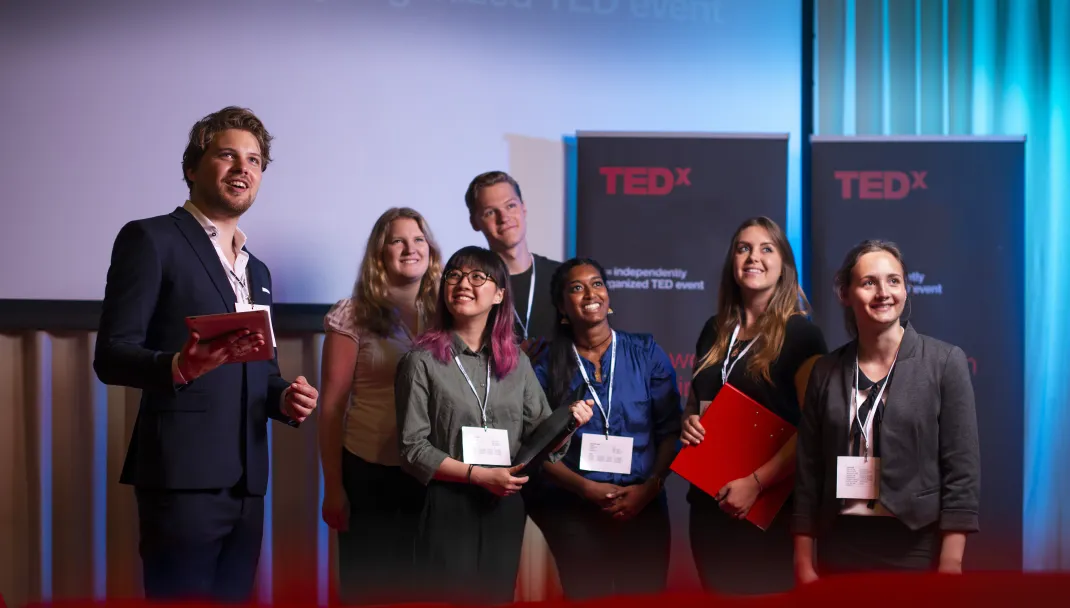
Leisure & Events Management
Contact details.
NHL Stenden University of Applied Sciences Rengerslaan 8-10, 8917 DD Leeuwarden P.O. Box 1080 8900 CB Leeuwarden The Netherlands
Tel: +31 58 244 1155 Email: [email protected]
WhatsApp: +31 6 13 57 99 31

BA (Hons) International Tourism Management with Placement Year
Immerse yourself in one of the world's most dynamic and diverse industries with this experiential degree. develop the knowledge and skills necessary to design and deliver exceptional visitor experiences, while learning a new language., book a campus tour, get info and updates, typical offer: 104–112, fees: £9,250 per year (uk), ucas code: n830, course length: various, location: university of hertfordshire, hatfield, institute code: h36, study a language option 2, study abroad option, work placement option, study a language, sign up for more information sign up for more information.
Learn a new language
Get involved in designing and creating a tourist visitor experience from your first year
Benefit from decades of industry experience and strong sector relationships
Course overview
Explore the vibrant and diverse international tourism industry, learning about its products, people, locations, and organisations, as well as the art of service.
Tourists are looking for well-planned and smooth-running experiences that impress with high levels of customer service. Develop the knowledge and skills to design and deliver such experiences confidently.
This course emphasizes practical considerations alongside theory, providing numerous team-based opportunities to deliver experiences, whether on-campus events or local excursions.
Gain an understanding of tourism industry products, structure, logistics, marketing, and management from an international perspective.
Explore the nature and impact of tourism activity and strategies for responsible tourism. You will assess current industry challenges such as the environmental, socio-cultural and financial impacts of tourism on a global basis.
Learn a new language (choose from French, Spanish, Mandarin, Japanese or German) to enhance your employability and cultural experience even more. If you study a language throughout the whole of your degree, it will be reflected in your degree title.
Apply theory to practice, honing employability skills, including customer service, and reflecting on experiences to further develop abilities.
You will enjoy field trips in each year of study, including a local destination in the first year, an optional international field trip (additional cost) in the second year, and a UK destination field trip in the final year.
Why choose this course?
We take pride in delivering a fantastic experience from the start, with a supportive, fun, and experienced team. As a caring and friendly university, you'll receive great pastoral support and engaging teaching to prepare you for professional success.
You'll also benefit from exceptional industry links as the course has been running for 28 years. We have many alumni and sector relationships. Engage with industry practitioners through guest lectures, and workshops giving you real-life insights.
You’ll also be able to study a language. Employers value foreign language skills, especially in the tourism sector and there are five to choose from.
Experiencing a culture is as important as learning about it. Immerse yourself in another country for an enriching and life-changing adventure, studying at one of our worldwide partner institutions.
As an international course, you'll develop an awareness of and sensitivity to different cultural backgrounds and influences. Enhance your learning with global case studies and opportunities for study and work abroad.
Assessments mirror your future working environment, encompassing posters, videos, debates, and learning conversations. Final-year students are expected to deliver a presentation at the student conference.
Enhance your CV and employability with our global work placement and study abroad opportunities.
Professional accreditations
The programme outcomes are referenced to the QAA benchmark statements for Events, Hospitality, Leisure, Sport and Tourism (2019). The SEEC Credit Level Descriptors for. Further and Higher Education (2021) have been used as a guiding framework for curriculum design.
Tourism Management Institute
The course is recognised by the Tourism Management Institute (TMI) and HBS is a key partner of the Association of British Travel Agents (ABTA).
Your future career
This highly immersive degree will have you career-ready for a role in international travel, tourism and hospitality businesses. 90% of students are working or in further education (Graduate Outcomes, 2018-2020).
Possible roles for employment include:
- Travel agent
- Tour operator
- Entrepreneur
- Cruise Ship Executive
- Tourism Product Developer
- Hotel manager
Graduates have gone on to a wide range of companies across the sector including TUI, Starbucks, Hilton, Seychelles Tourism Board (STB), MSC Cruises, easyJet, Enterprise Car Rental, British Airways, Virgin and Marriott.
The world is literally your oyster with this industry-focused, well-rounded course! Because you leave with so many transferrable skills, you can use them in other areas of business – after all, happy customers make all businesses thrive!
See what recent graduates are up to
Ellie fowler.
Operations Communications and Activity Executive
Greene King
Elizaveta Zaskalko
Account Manager
Expedia Inc
Operations Communications and Activity Executive at Greene King
Meet Ellie Fowler who has excelled professionally since graduating in 2019. Ellie currently works as an Operations Communications and Activity Executive for Greene King.
University experience
Ellie emphasises how her course really helped her to progress professionally and land her current role. She says, 'My studies helped me by teaching me all I needed to know about business and how different businesses work/operate. I didn't just learn about "how to go on holiday," I learnt how these travel companies run their businesses from all different levels and it made it clear to me to see I was interested in working in the Head Office side of things rather than front facing.'
She thoroughly enjoyed her course and highlights how useful the skills she learnt were in furthering her career. She continues, 'The travel knowledge you learn is very helpful. I like being able to educate and help people with all things to do with the travel industry.'
Ellie encourages students to embrace their studies with open arms and notes, 'The advice I'd give to new students is to be motivated and more organised from the beginning. I would definitely recommend doing a placement year abroad with this degree because not only does it give you vital industry experience, it also shapes you as a person. Without this experience I wouldn't be where I am today, and I definitely wouldn't have friends all over the world!'
Aspirations for the future
Ellie plans to progress in her role and take on more responsibilities. She says, 'I aim to get higher into operations for Greene King and then hopefully move to work for a bigger tour operator, as the tourism side is more suited to me.'
Account Manager at Expedia Inc
Meet Elizaveta Zaskalko, who has explored the tourism industry and shared her passion for travel. She works at Expedia Inc as an Account Manager.
A passion for travel
Elizaveta always had a passion for tourism and knew her career would be within the industry. She works at Expedia Inc as an Account Manager and is responsible for the brand's relationships with Marriott, Hilton, and other chains in Europe, the Middle East, and Africa.
Studying at the University gave her a vast knowledge of the tourism industry and prepared her for entering the sector. Tourism is a diverse and global industry, with many career opportunities for new graduates.
She says, 'When I started my studies, I knew that I wanted to work in the tourism industry but had no idea which part of it. As I progressed, I learned about so many different branches of the industry and it really helped me to narrow it down to the one I actually really enjoyed.'
Strong employment links
'The best thing about my course is that it prepared us for the working world. The programme had a huge focus on employability, which I think was incredibly useful. Coming out of university I knew where I wanted to go, what I wanted to do and how to achieve it.'
The employment focus and links to industry embedded into Elizaveta's degree are what persuaded her to study at Herts. Our courses are designed to give students great opportunities, prepare them for professional life and provide them with direct access to their chosen profession through expert teaching and tangible industry connections.
Elizaveta says, 'An important factor for me choosing to study at the University was being able to do an industry placement year, as it's very hard to get a job without work experience nowadays. My placement year was very challenging but it was one of the most useful experiences I have had so far.'
What you'll study
The course takes either three or four years, depending on placements/study abroad and you cover everything you need to be effective in tourism management.
There are core modules such as marketing, management and professionalism. You also have the option to choose modules in specialist areas, allowing you to tailor the course to your own interests and career direction.
In your first year, you engage in designing the visitor experience and delivering the visitor experience as core modules as well as professionalism in tourism.
As you move into your second year, you focus more on key areas for the sector such as sustainability and technology. There is also the opportunity to enjoy an international field trip as a key learning experience.
Your final year has a strong focus on global tourism planning, attraction management and contemporary issues. You will also deliver your own visitor experience, working alongside events students.
There are also opportunities to further enrich your personal development through our GoHerts program, placements, internships, study-abroad and Future Success team events.
What if I need support?
You'll benefit from dedicated support teams within the Business School, including Academic Support, Wellbeing, and a personal tutor who will assist you in adjusting to the demands of university learning and living.
Additional support is available from our Student Success team, which focuses on inclusive learning, as well as our dedicated Future Success network, which helps with work experience, placements, and graduate jobs.
You can join and engage with the Business School Student Voice community, consisting of a team of student representatives who regularly meet with staff to provide feedback and ensure the effectiveness of teaching.
Our in-house Centre for Academic Skills Enhancement (CASE) is available to all Business School students, offering additional support in areas such as academic writing, numeracy, and referencing.
Optional sandwich year
Work placement, study abroad.
At the end of your second year, you have the option to experience a year of working life with a placement, or a shorter internship, a huge CV booster!
Professional work experience is the biggest contributor to your future employability. It allows you to put your knowledge into action, while learning how a business operates and making some handy professional connections.
We'll help you make the most of the experience, holding your hand from start to finish. You also get assistance with your CV, plus help preparing for interviews and presentations, at our ground-breaking mock Assessment Centre Experience.
Students on the programme have had the opportunity to work at Walt Disney World Resorts, MSC Cruises, Ramblers Walking Holidays, Hilton Hotels and Wendy Wu Tours. We also have a relationship with BSG internships which has enabled students to gain placements in Country Clubs in Florida.
You can take a sandwich year abroad, making that decision in your second year. Studying at one of our international partners is a huge personal development opportunity and an amazing experience.
More and more companies are now working internationally, the experience of living in another country will make a great impression on future employers. Put knowledge into action, learn how a business operates and make professional connections.
With over 100 partners in 40 countries, the world really is your oyster! Our dedicated study abroad office advises you on your options, to help you make the most of this opportunity.
If you study abroad between your second and third year of study, you’ll pay no tuition fee, either to the partner university or us.
Where you'll study
You'll be taught on our modern de Havilland Campus, with our 24/7 Learning Resources Centre, offering open and private study spaces. You also get online self-study materials to further support you.
There are dining options, a bar, and a recreational space on campus where you can shoot some pool or play video games. It also houses Hertfordshire Sports Village, featuring a gym, swimming pool, coffee shop and climbing wall.
Discover the Enterprise Hub, a vibrant destination where local firms and students work and learn in comfort.
The Student Union bar and additional facilities are only a 20 minute walk (or short bus ride) away at our second campus, on College Lane. Student housing is available at both campuses.
A train to central London takes just over 20 minutes, and you are also conveniently located on the A1(M) with access to the road network, making travel quick and convenient.
Who you'll learn from
Your teachers include doctoral staff and industry experts who will impart their knowledge and experiences. They will ground your education in solid business principles and case studies that will be valuable throughout your career.
The teaching approach emphasizes proactive learning, drawing from real-life experiences and scenarios shared by your tutors and alumni.
The faculty covers various interest areas and backgrounds, including information technology, marketing, consumer behaviour, psychology, employee well-being, and work-life balance.
Additionally, you have access to an academic support team, a well-being team, and a personal tutor who will help you navigate university learning and living.
Working together, your teaching and support team is committed to assisting you in realising and achieving your full potential.
Check out our student blogs
Kira - Week at a glance
Read about our student's favourite aspect of the course
Kira - Choosing my course
Kira - Why I chose Herts
How we support our students
At the university of hertfordshire, we want to make sure your time studying with us is as stress-free and rewarding as possible..
We offer a range of support services, from childcare to counselling, ensuring that you make the most of your time at Herts and can focus on studying, having fun, and have the support you need.
Student Blogs
My week at a glance.
On a Sunday night, I’ll always write out plans for that week in a calendar on my wall to remember by lecturers, seminars, meetings with lecturers and classmates for group work, including my shifts for work. After I’ve got down the compulsory activities, I’ll enter all the social events or fun things I want to do, meeting with friends, lunches, activities to attend on-campus like Active Student roller skating parties or course parties where us students and lecturers get together. Then I’ll enter allotted times to work and study, concentrating on specific modules or assignments but trying to encompass some fun things to do throughout the day, or least some wellbeing time, whether it is going to the gym, reading, or doing my hobbies. Throughout the week, I try to stick to the calendar as much as possible, ensuring I do enough uni work to balance with the social activities, attending lecturers and office hours with staff. Between working a part-time job and having an active social life, I aim to get six hours of uni work done per day, depending on how close deadlines are.
Especially in the final year, it’s so easy to get caught up in assignments and workload but staying physically and mentally active goes further than procrastinating at a screen for an hour on end. With the girls on my course, we always make time for Friday lunch where we sit in the de Hav café and catch up before our final lectures of the week. We often catch up with other mates in there, making it a social area and a nice end to the week and we try to book study rooms in between lecturer gaps to have some downtime or catch up with notes together. There plenty to do on the weekends too, including EleHouse and the forum on College Lane Campus, St. Albans has a great nightlife with all sorts of bars and pubs and Hatfield has the Galleria, a massive outlet shopping area which is great to walk around. I’ll normally work a few hours over the weekend at the gym and finish my shift off with a swim before going to Aldi or Asda to get my shopping for the week. My girls and I sometimes meet up in the evenings to enjoy a film and wine night too which is a fantastic way to replenish for the week ahead.
What I love most about my course
As a final year tourism management student who take a placement year, I’ve had four years to experience the university and strength my course offers. One of the best things about my course must be the lecturers. It’s a very cliché thing to say but the team are so strong and friendly! Referred to as the THEM team (Tourism, Hospitality and Event Management), the lecturers are all good friends and it shows; and I would genuinely consider many of the lecturers my friends too. They are always down for a chat, helping with assignments and lecture notes wherever possible. Our module leader, in particular, is fantastic and we have little social events with the THEM team, such as Christmas parties fueled with prosecco and orange juice, career networking with hundreds of job opportunities and it is always someone’s birthday within the tourism management course so there is a constant supply of cake! The team are professional, knowledgeable but super approachable and kind-hearted too with our interest in the forefront of their mind.
My course has so many aspects to it as well, so I’ve covered modules such as tourism planning, HR (Human Resources), strategic business management, data analysis, international field trip and niche tourism. The best module was the international field trip whereby we went to Marbella in the second year and undertook a photograph observation assignment. Not only did we go but we were able to plan our own trips and ended up in this really secluded, beautiful village called Ojen, which lead to a shift in my career path and influenced my placement year which I’ll talk about a bit more in a second. The course also entails a whole load of trips, ranging from The British Museum, World Travel Market, Signature Airport (a private airport where we viewed the operations, apron and guest suites - we even sat in the same chair as Beyoncé), Shakespeare’s Birthplace and loads more. The opportunities within this course are endless. My placement year was one of the best opportunities I had too, where students take a year out to work in an industry-related role, having a hands-on experience learning from industry experts. This is not a mandatory part of the course either so students can simply do a three-year course or take the placement or study abroad choice. I worked within an organization called Wendy Wu Tours, designing tailormade holidays and ended up setting up my own team, managing and training days which gave me a heap of experience. In the meantime, my course mates went off to all corners of the world including Japan, Spain, Singapore, and Disneyworld so there are endless opportunities.
Why I chose Herts
There are a plethora of reasons why I chose Herts but the main one, for me, was the opportunities available within my course, Tourism Management. With a sandwich year available, I was granted the opportunity within a dream job which has helped with my career direction post-graduation, which wasn’t necessarily available at other universities. In addition, 80% of the tourism management course also took a placement/study abroad year meaning we can all graduate together! Secondly, the teaching staff at Herts are highly knowledgeable, professional and had great connections from a quick LinkedIn search, which, upon reflection, was fully used throughout my degree with many networking events, guest speakers and course trips.
Moreover, geographically, Herts is in a great position. Central London is only a 20-minute train ride away and I was close enough to home for some of my mum’s classic roast dinners. Based just a few minutes walk from campus, the Galleria has some awesome shops and restaurants to check out if you fancy some time off, which is also great for job opportunities for students. Herts also has some cool socials and nightlife; from EleHouse, The Star Bar and The Forum, there’s always something going on to get involved in. The Forum does theme nights too which are always a crack, such as Charlie and the Chocolate Factory, 90s classics and the Christmas party is always a highlight. Aside from partying, the Active Student events were super appealing, from sunrise yoga to roller-skating, these free events allow students to meet new people and get active together, alongside over 100 societies to get involved in.
Entry requirements
The University of Hertfordshire is committed to welcoming students with a wide range of qualifications and levels of experience. The entry requirements listed on the course pages provide a guide to the minimum level of qualifications needed to study each course. However, we have a flexible approach to admissions and each application will be considered on an individual basis.
UK applicants
International applicants, ready to apply, uk and eu applicants with pre-settled/settled status in the uk, international and eu applicants without pre-settled status in the uk.
Apply through our international/EU application portal
Fees and funding
At Herts, we’re dedicated to providing world-class teaching supported by industry-level facilities and incredible social spaces. We believe cost shouldn’t be a barrier to higher education, and we strive to keep both our standard and additional costs as low as possible.
Tuition fees
Tuition fees are charged annually. The fees quoted above are for the specified year(s) only. Fees may be higher in future years, for both new and continuing students. Please see the University’s Fees and Finance Policy (and in particular the section headed “When tuition fees change”), for further information about when and by how much the University may increase its fees for future years.
Additional information
More about the course, further information, not ready to apply, undergraduate subjects.
Discover our full range of undergraduate courses
Student Life at Herts
Find out more about life at Herts
Chat with students and staff
Ask current students about their experiences at Herts
Travel & Tourism Development Index 2024

The Travel & Tourism Development Index (TTDI) 2024 is the second edition of an index that evolved from the Travel & Tourism Competitiveness Index (TTCI) series, a flagship index of the World Economic Forum that has been in production since 2007. The TTDI is part of the Forum’s broader work with industry and government stakeholders to build a more sustainable, inclusive, and resilient future for economies and local communities.

IMAGES
COMMENTS
Tourism supports one in 10 jobs and provides livelihoods for many millions more in both developing and developed economies (unwto.2022). Informed by industry demand and the array of job opportunities available, Glasgow Caledonian University's MSc International Tourism and Events Management programme delivers the practical and technical ...
Learn More About the International Institute of Tourism Studies. Since 1987, the International Institute of Tourism Studies (IITS) has supported the MS in Tourism, Hospitality and Event Management program in addressing the challenges posed by the tourism industry and helping communities that rely on visitors to manage their cultural and natural ...
Your International Tourism & Event Management Master's program. The tourism industry has a huge importance both in Germany and worldwide. In 2019, more than six percent of all employees in Germany worked in jobs related to tourism consumption and tourism-related goods and services worth nearly 280 billion euros were produced.*
The second section "International Events Management in Practice" is the core focus of this book, and covers in eight chapters the management issues that event managers will face in practice. These chapters are well-constructed and packaged, and in each chapter, the current research knowledge on the topic along with the event manager's ...
International Tourism and Events Management ; About. Informed by industry demand and the vast array of job opportunities available, the International Tourism and Events Management programme from Glasgow Caledonian University delivers the practical and technical experience that you need to maximise the opportunities this growing sector has to offer.
The University of South Carolina's Master of International Hospitality and Tourism Management is designed for industry professionals who want to propel their careers. USC's School of Hospitality and Tourism Management is ranked in the top 10 in the U.S. and top 20 in the world.
Around the world, as many as one in ten jobs are directly or indirectly based in the tourism and events sector. Career Opportunities. The Master's program in International Tourism and Event Management at Hochschule Fresenius University of Applied Sciences prepares graduates for direct entry into strategic positions at tourism and events ...
By taking the International Tourism and Events Management (Hons) programme from Glasgow Caledonian University , you will be equipped with business and management knowledge incorporating an international perspective. This includes planning, marketing, and staffing through to risk assessment and securing funding to create, manage and deliver ...
Glasgow Caledonian University offers an MSc in International Tourism and Events Management that will equip you with the practical skills and technical knowledge needed to excel in this industry. This programme provides a global perspective, allowing you to understand real-world issues and make responsible decisions.
Our International Events, Leisure and Tourism Management MSc will provide you with strong academic and professional skills that will help you to become a leader within events, leisure, tourism or the wider creative industries sectors. The programme combines the principles of generic and specific management knowledge.
Our MSc in International Tourism Management will provide you with the essential skills and knowledge needed for a successful career in industry. 95 per cent of our School of Hospitality and Tourism Management postgraduate students go on to employment or further study (Graduate Outcomes 2023, HESA).
This programme consists of three terms (10 weeks each) and a term of dissertation (12 weeks). During its first three terms, the MA in International Tourism, Hospitality and Event Management will cover key topics such as marketing planning, strategic approaches in tourism and hospitality business, operational management, cross-cultural management, event management and entrepreneurship.
Informed by industry demand and the vast array of job opportunities available, Glasgow Caledonian University's MSc International Tourism and Events Management programme delivers the practical and technical experience that you need to maximise the opportunities this growing sector has to offer. You'll enjoy a truly international experience, with ...
The international tourism and events sector has witnessed phenomenal growth and significant change in recent years. With global opportunities and a range of career choices, there has never been a more exciting time to pursue a career in international tourism and events management. Our programme develops your cultural understanding of events and ...
International Hospitality, Tourism and Events Management - BA (Hons) This BA in (Hons) International Hospitality, Tourism and Events Management course will provide you with the business management skills and practical expertise that the best employers in international hospitality, tourism and events are looking for.
International students. If you are an international student enrolling on one of our postgraduate programmes (e.g. MSc, MA) in 2023/24, your fee for this academic year will be £14,500 per year. T he course fee for academic year 2024/2025 is £15,000 per year. View international fees.
View undergraduate fees. International students. If you are an international student enrolling on a full-time foundation degree or a BA/BSc in 2023/24, your fee for this academic year will be £13,500 per year. T he course fee for academic year 2024/2025 is £14,000 per year.
Industry accreditations: The University is a member of the Tourism Management Institute (TMI), Association of British Travel Agents (ABTA), and the Association for Event Management Education (AEME). Employment prospects: Graduates work as hotel customer relations managers, travel agents, and airline staff for organisations including Four Seasons Hotels and Resorts, Expedia Group, and TUI.
This 18-month MA Tourism, Hospitality and Event Management programme consists of four terms. During its first three terms the programme will cover fundamental topics such as marketing planning, strategic approaches in tourism and hospitality business, operational management, cross-cultural management, event management and entrepreneurship.
With the Master's in International Leisure, Tourism and Events Management, you will develop into a professional leader in the leisure, tourism and events sector. You'll gain insight into the challenges faced by the industry and how these issues can be managed responsibly within the context of the UN Sustainable Development Goals. Investigating key concepts from academic fields such as ...
International case studies will be used to explore the provision and management of tourism and events. Events and tourism are often used for economic, social, or political gains, so by considering impacts this has on the destination, students will be encouraged to offer solutions to help mitigate issues that tourism and events can bring to a ...
The Travel & Tourism Development Index (TTDI) 2024 is the second edition of an index that evolved from the Travel & Tourism Competitiveness Index (TTCI) series, a flagship index of the World Economic Forum that has been in production since 2007. The TTDI is part of the Forum's broader work with industry and government stakeholders to build a ...
Supply chain innovation paths and resilience management under sudden social public events: a meta-analysis. Authors: ... Proceedings of the 2009 International Conference on Management of e-Commerce and e-Government . The tourism industry under the supply chain conditions is of powerful competitive advantages, which should be integrated and ...